Free at last. Faces of Konfederacja
The six protagonists of this text will vote for Konfederacja. We endeavour to understand why.
The SPA complex sitting in the centre of Rumia, a town located just outside Gdynia, Poland, advertises itself as one of the largest conference hotels in Poland. The reception hall is the size of a football pitch; not easy to find your way here, despite the signs pointing the way. When I finally reach my destination, a rectangular room with hundreds of tightly spaced chairs wrapped in white fabric, there is no one there except the organizers.
The day is January 21, 2023; I am at one of the twenty local primaries of Nowa Nadzieja (New Hope). It is one of the strongest factions, next to the National Movement and Confederacy of the Polish Crown, forming Konfederacja Wolność i Niepodległość (Freedom and Independence Confederation), a nationalist, economically neoliberal, and ideologically conservative camp formed at the turn of 2018 and 2019.
An hour later a crowd fills the hall, the queue of voters winding down the hotel corridor. Young men, neatly shaved or with intricately trimmed beards, dressed in elegant suits. The women accompanying them – a clear minority, they make up maybe a fifth of the participants – wearing tight trousers or skirts and slightly provocative blouses with deep necklines.
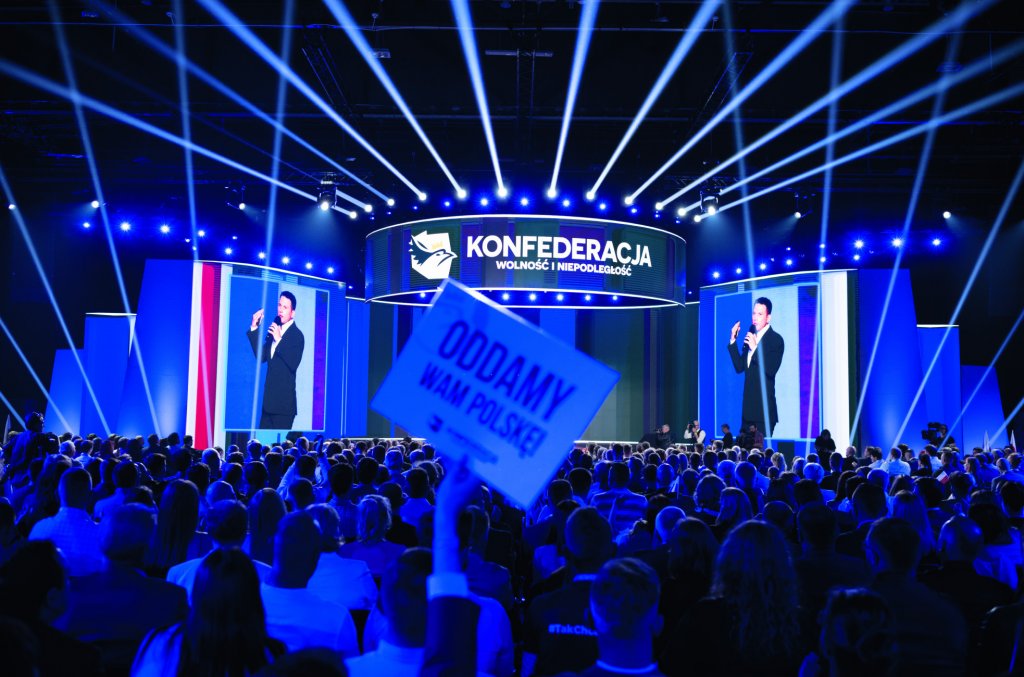
I have just finished reading Strangers in Their Own Land: Anger and Mourning on the American Right by the American sociologist Arlie Russell Hochschild. The author describes five years spent among the residents of the most right-wing state in the USA. She tried to understand why so many people in Louisiana opposed federal aid when their region was its biggest recipient, why they hated environmentalists when their neighbourhoods were so polluted, and why they voted Republican as they used Obamacare.
As a sociologist, she was primarily interested in the emotions behind the political views. I do not possess her sociological toolbox, but as a reporter I was also interested in this approach, and the “deep story”, the metaphorical representation of the experiences of Konfederacja voters, seemed intriguing to me.
I decided to peer into their souls, although many of my friends warned me against it.
Some of them categorically stated that they would never talk to such people, and a member in an association which I considered a bastion of tolerance wrote that they do not participate in meetings with the “extreme right” nor debate with it; instead, she offered me a report full of “examples of hate speech by representatives of Konfederacja”.
But the more I heard such warnings, the more intrigued I became. And I saw all the more wisdom in Hochschild’s words: “Our polarization, and the increasing reality that we simply don’t know each other, makes it too easy to settle for dislike and contempt.”
Read more: Why we vote against our interests
But the more I heard such warnings, the more intrigued I became. And I saw all the more wisdom in Hochschild’s words: “Our polarization, and the increasing reality that we simply don’t know each other, makes it too easy to settle for dislike and contempt.”
Zbigniew
At the primaries in Rumia, I speak with Zbigniew Zalewski. He is the first Konfederacja supporter I meet. Since I called him, back in 2022, he has been intrigued by my proposal, he asks for a moment to think, wants to consult with his mother and girlfriend, until finally curiosity outweighs fears.
He is thirty-two years old, sports a neatly trimmed goatee and works as a lawyer. His modest office, set up in the basement of a block of flats in Rumia, is located opposite the station so on a January day the snow and rain has not the time to soak me through as I run from the train to the interview. Zalewski chose this place for the convenience of clients arriving by rail. Most of them are from outside of Rumia.
He invites me inside, sits down at his desk, but then realizes that I am not a client, and sits across from me at the table. The distance thus decreased, we drink mineral water served in glass bottles.
“I hate communists,” he declares at the beginning of the conversation. He inherited his views from his parents, a couple of dentists, especially from his father, a declared anti-communist. When Zbyszek was fourteen years old, his father suggested Alexander Solzhenitsyn’s The Gulag Archipelago for his reading. “At our home, we were always right-wing, truly right-wing.”
In the first democratic presidential elections, his parents voted for Lech Wałęsa, although they also valued Tadeusz Mazowiecki. But in 2005, in line with the principle “the more to the right, the better”, they cast their ballots for Law and Justice (PiS).
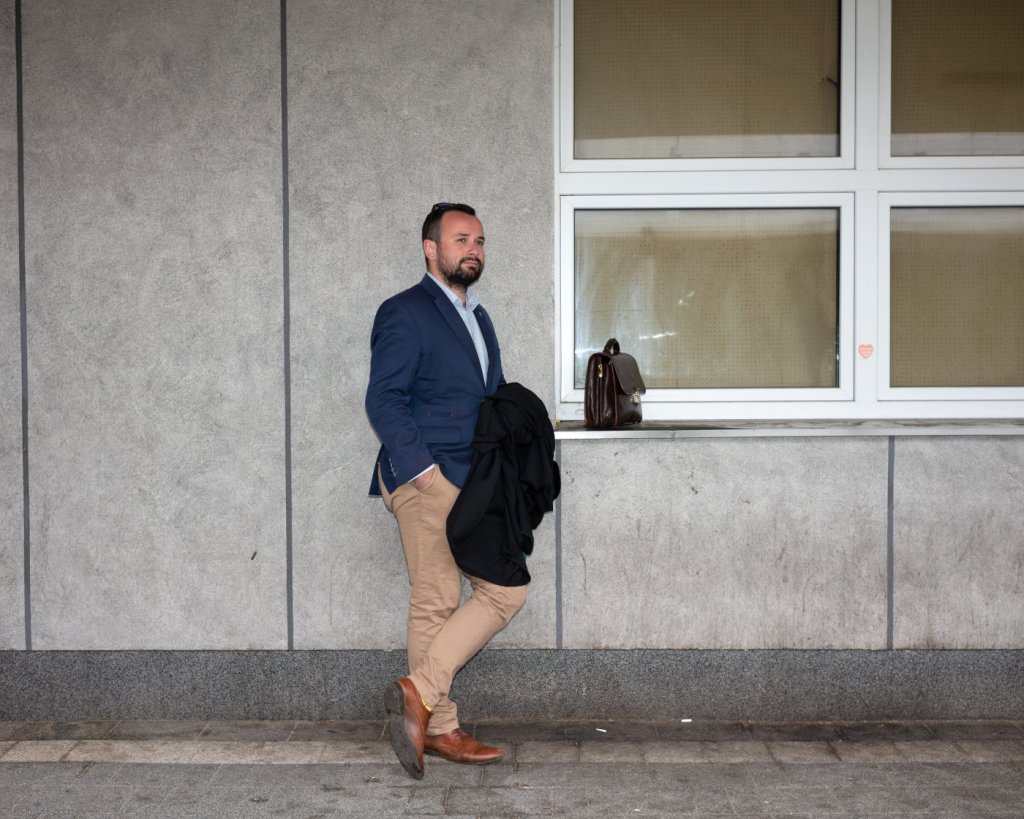
Zbyszek was fifteen years old at the time and remembered the slogan “Take your grandmother’s ID”. His parents were not pensioners, they had higher education and a good profession, they were no easy target for ridicule. In addition, his father did not show offence at anyone, and he discussed politics calmly, using well thought-out arguments.
In high school in Sopot, he heard jabs: that PiS was for the „moherowe berety” (derogatory term for conservative older women), that it was backward, and it was no surprise that a guy from Rumia held such views, because in Kashubia, they mockingly refer to Rumia as „Rumunia” (Romania).
In high school in Sopot, he heard taunts: that PiS voters are “mohair berets”, that they are rubes; no wonder a boy from provincial Rumia ended up with the views he has.
In 2007, Zbyszek’s father died, and he immersed himself in reading Milton Friedman and Friedrich von Hayek and became an economic liberal. He began to support the Congress of the New Right (KNP). Because although Janusz Korwin-Mikke, the formation’s leader, was sometimes annoying and provocative, he had clear views. And he was right-wing. When in 2014 the politician ran for the European Parliament, Zbyszek nervously watched the TV, debating with a friend on the phone, and finally opened a chilled champagne.
“I was a so-called pony [a nickname for uncritical sympathizers of the Korwinist trend – M. W.], and when Korwin was ousted from the KNP, I followed the king,” he recalls. Without hesitation, he volunteered to collect signatures in support of the KORWiN party before the next elections. The family were shoo-ins (he infected his younger brother and mother with Korwinism), the neighbours signed without asking; only in the office where he worked, some people frowned.
Today he feels that he is in the minority, but he stubbornly defends his own views. He does not accept that you can take from one man to give to another, by which he means the state apparatus and its redistribution system: social security, child grants, subsidized loans. He regrets the fact that the state is no longer a guardian of public order, but presumes to interfere in the economy.
“Justice is justice. If we add ‘social’ to it, it loses its basic meaning. Something like a ‘democratic people’s republic’. A conglomerate of contradictory concepts,” he argues. He regrets that most Poles think differently.
We have to take a break, because Zbyszek has a client. A standard divorce case.
I go to dinner, it’s raining in Rumia, and when I return to the law firm soaked, Zbyszek says that a wave of divorces was expected during the pandemic, but he sees a real spike only now. No, he does not imagine divorce being removed from the family code.
“That would rather result in more homicides. I think that a relationship is there to serve the people involved and divorce is also for their good. In civil law, Catholic norms should have no place. At the same time, I think a marriage is a relationship between a woman and a man,” he emphasizes.
When I remind him that Sławomir Mentzen is in favour of introducing so-called indissoluble marriages, Zbyszek explains that ideological issues are the least important ones for the country at the moment, but the co-leader of Konfederacja – being aware of a significant conservative and traditionalist electorate – does not want to leave a monopoly in this area to Krzysztof Bosak and Grzegorz Braun. He is glad that Mentzen has replaced Korwin as the leader of the party, because although he appreciates the latter, he thinks that his views and statements should have been kept out of the public’s eye before the elections: such as that “under Hitler taxes were lower” (true, but needs the right context), that “Russia is right” (unacceptable and extremely stupid), that “the disabled are morons who are not worth paying attention to”. The latter struck Zbyszek personally. While still a student, in 2010, he was diagnosed with multiple sclerosis. He manages, takes state-of-the-art medications, tries not to worry about the disease.
That day we talk for a long time and on various topics. “I’ll introduce you to my mother. And my younger brother, when he returns from the sea, because he is a steward on a ship. And to my girlfriend, of course,” he announces.
They have been together for eight years. Mariola, who turned thirty-one this summer, is the manager of a clothing store in a shopping mall. And like a “typical woman”, according to Zbyszek, she is not very interested in politics.
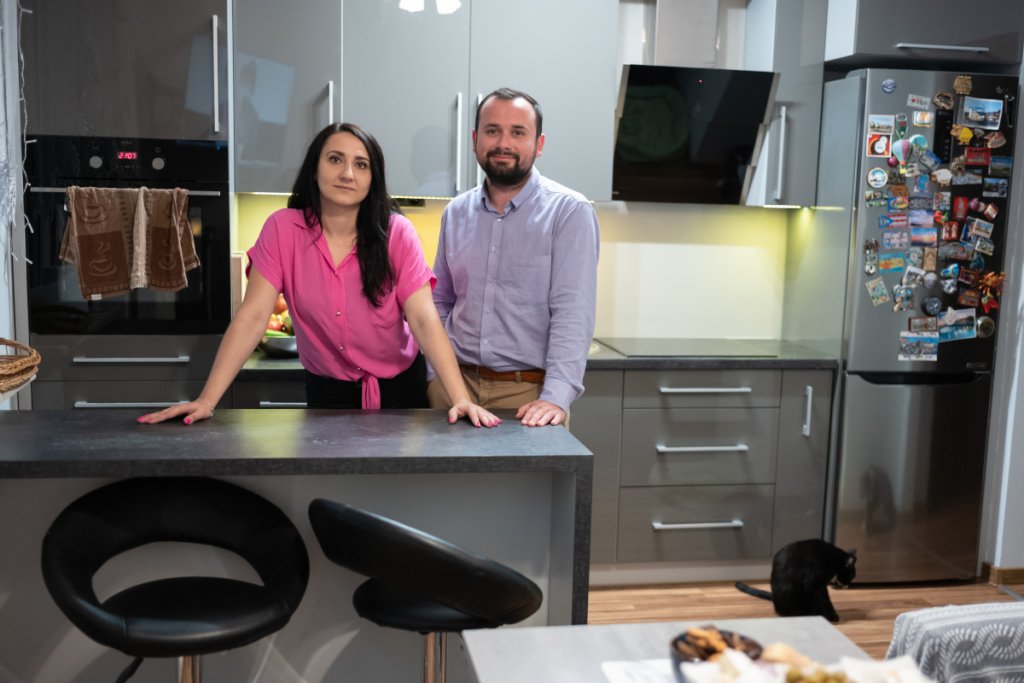
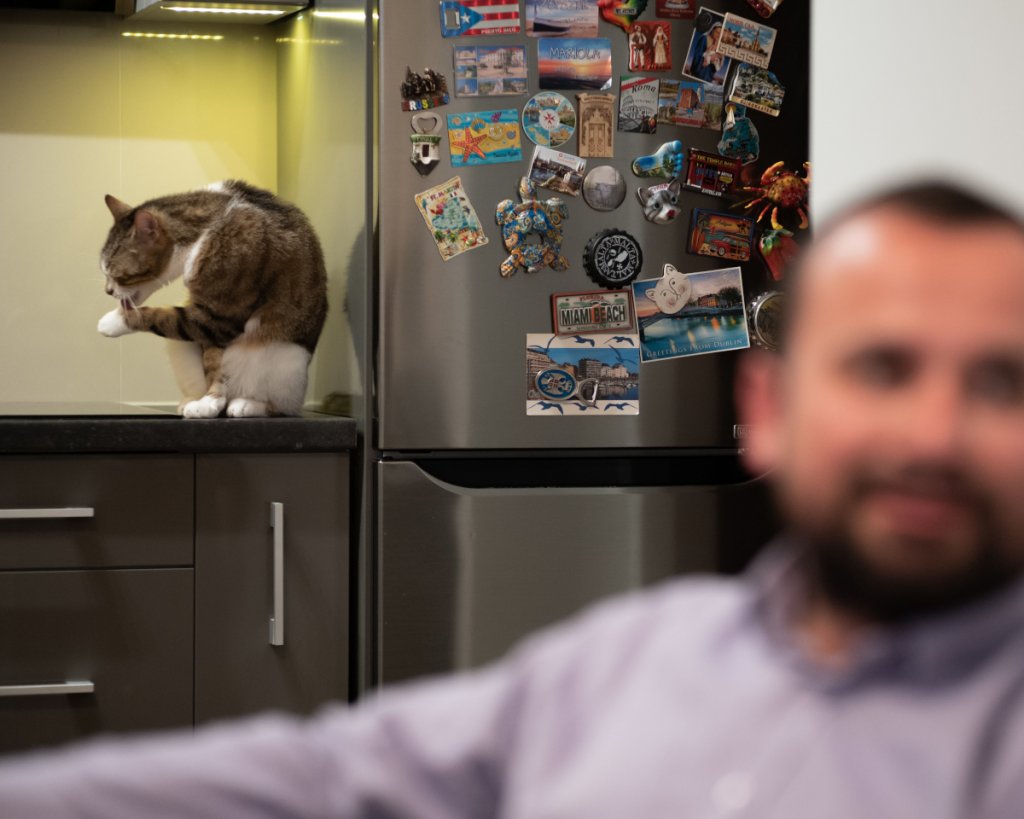
“But we don’t have a relationship model like Korwin, in which the man decides about everything. I am not a despot,” he emphasizes. “I allow her to participate in many decisions, I talk to her, I consult her, although she is aware that in some areas as a man I am better, more efficient, and she accepts it.”
“You allow her to participate?”
“I used to be a supporter of the traditionalist model: the man earns money and the woman takes care of the house. But we do not follow this model. Life has verified my ambitions when it came to my earnings. Besides, now I think it’s good when a woman also works.”
We say goodbye at the staircase exit. Hail pummels my face, the wind blows my hat off my head.
At the beginning of March, when I visit Zbyszek in Rumia for the third time, I finally meet his girlfriend.
Zbyszek comes out to meet me, but he gets distracted talking to an old colleague at a bench, who – as I will find out later – has recently been released from prison, and does not notice me passing. Mariola opens the door to their apartment. A nice brunette with loose hair, she invites me to sit at a table set with olives, stuffed peppers, cheeses, and chips. She came to Pomerania to study from Masuria, where they met.
The apartment is small: a bedroom and a rather cramped living room with a kitchenette, where three cats fight for their place, and a balcony with a pleasant view of the hilly vicinity of Rumia. TVN24 [a mainstream news channel – translator’s note] is on TV.
Out of breath, Zbyszek bursts in after a while and brings us a beer each.
“Mariola has made enormous progress. When we met, she had an average knowledge of history, she was not a fan of politics. And with me…” Zbyszek puffs out his chest and Mariola bursts out laughing.
“We talked a lot, Zbyszek recommended me one book, then another (biographies of Lenin and Trotsky to begin with),” she says.
“Did you change your political beliefs under his influence?”
“At my home, we did not talk about politics. I don’t even know who my parents voted for. I didn’t vote myself. When I started discussing this with Zbyszek, I agreed with many of his views, I found that I had felt the same way before. So we got along from the beginning.”
I ask Mariola about being “allowed to participate in decisions” and the advantages men have in some respects, which Zbyszek told me about during our first meeting.
“It’s natural,” she says. “I also allow him to take care of the house, cook, clean, because he hasn’t done it before. Zbyszek asks me for my opinion on topics related to his profession, to our investments, which are an area he is better suited to. He can make a decision efficiently and accurately, I sometimes have a problem with that.”
Even before, at our first meeting, Zbyszek promises to introduce me to other confederates, perhaps some of them will be willing to talk to me. He will vouch that I am not a leftist.
Marcin
When I comb the hall during the primaries in Rumia in search of interlocutors, I see Marcin Ndzondzo on the far side. I will not pretend that the colour of his skin did not attract my attention. Tall, handsome, with a long face and a twinkle in his eyes. He is thirty years old, a sushi master living in Rumia.
I quickly explain what I am after, because the voting is already underway, and he explains that he became firmly interested in politics only half a year ago, that he is very into it and that his party – no doubt about it – is Konfederacja. As it soon turns out, apart from the colour of his skin and his origin (he is a war refugee from Africa), he is close to a typical voter of its liberal wing.
A week and a half later, on February 1, I run late to meet him in Rumia. This late in the evening, only a McDonald’s is open in the area, there is no open pub nearby, but it suits Marcin, he tries not to drink alcohol. I get us each a pack of carrots. We crunch on them as he tells me how twenty-one years ago his parents brought him from the Congo to Suwałki, the coldest city in Poland.
His mother was Polish, his father was Congolese, the eldest son of the village chief. They met in Warsaw at the University of Technology. After their first son was born, they settled in Africa, where she was a shift manager at a bakery and he was an engineer in a plastic goods factory. Five years after his eldest brother, Marcin was born. They saw their future in Africa, they liked the family and personal relations there, but a civil war broke out in the Congo. It was 1997, Marcin was four years old. They ended up in their mother’s home city.
“They keep asking me if I’ve encountered racism, and I don’t remember such situations at all. Maybe some stupid comment in the street, and from the mouth of an older person, resulting rather from fear, because she probably had not seen a black man before. Nothing unpleasant has ever happened to me here. And yet for years we lived as the only person of colour among tens of thousands of inhabitants.”
He appreciates the close-knittedness of the Polish family.
“My parents, my mother’s sister, uncle, and cousins – we always stayed together. It was only after I left for the city that I heard about broken families and met young people who did not hold to family values. I noticed that more and more families are not able to hold on to this happiness.”
Marcin’s parents were close to not being able to hold on either. After moving to Poland, he, his brother, and their mother enjoyed dual citizenship. His father had only the Congolese, for eight years he waited for the Polish one and the possibility of legal work.
“And my parents barely survived this period,” admits Marcin. “They didn’t get along. Grandma came to intervene in time. She explained to my mother what marriage was all about and that father is a worthy man. I’m glad that my mother realized that, I thanked her for it once. I am proud of my family. Gives me more happiness than any money could. Because what else will I have left at the end of the day?”.
Over carrots at McDonald’s, we smoothly move from family history to – as Marcin explains to me – the deteriorating social status of men and their undervaluation in relationships.
When I ask Marcin about examples, he talks about unequal working hours and retirement ages. About the fact that today’s women would like to be masculine and expect men to take on feminine traits. About men beaten by their wives, but not admitting it for fear of ridicule.
“Maybe only 10 percent of the old-style men are left, supporting their families on their own. Successful people, earning more than double the national average [i.e. about 15,000 zlotys before taxes – M.W.], who also have a lot of children,” he sums up.
Marcin is not alone in Konfederacja with his views on discrimination against men. Zbigniew Zalewski and his girlfriend Mariola told me the same.
“As for the extremes,” she noted during our first meeting, “nowadays it is men, not women, who are discriminated against. I don’t understand what equality for women we are supposed to still be fighting for. No one keeps me at home by force. I go to work, I can study, I can dress like I want. I don’t see that I have worse opportunities than Zbyszek. I have never encountered unequal salaries either, unless somewhere in higher positions. I really don’t understand what the problem is.”
“The differences were determined by nature,” added Zbyszek. “Statistically, women will always earn less because they have a uterus and give birth to children. For the employer, this is often a decisive factor.”
Mariola also noticed it:
“I experience it myself, because I work in a managerial position and I know what a problem mothers of small children are for an employer.”
“You’re not going to get married?” I ask when we first meet.
“My woman also has right-wing views, we care about our relationship, but we have come to the conclusion that the institution of marriage is not needed for a real partnership,” he answers.
Monika is an electroradiologist, she comes from Toruń, works in a hospital in Gdynia, they live together.
First priorities are the home, money, security. Marcin is still looking for a way to achieve it. He quit studying sea transport at the Gdańsk University of Technology, and then electric and hybrid vehicle engineering in Warsaw, also because he felt bad in large cities. The urban racket overwhelmed him. In a smaller, quiet space, he regains his vigour. He became a chef, obtained a sushi master’s certificate, started working in an Asian restaurant in Reda, and settled in Rumia.
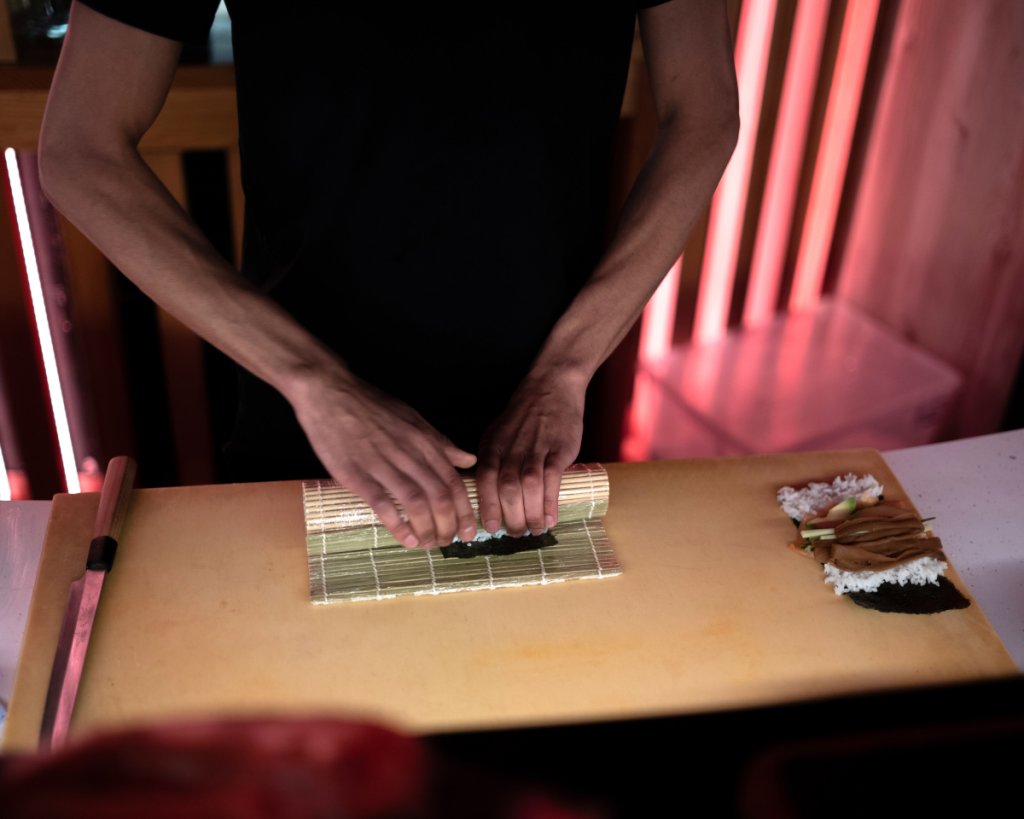
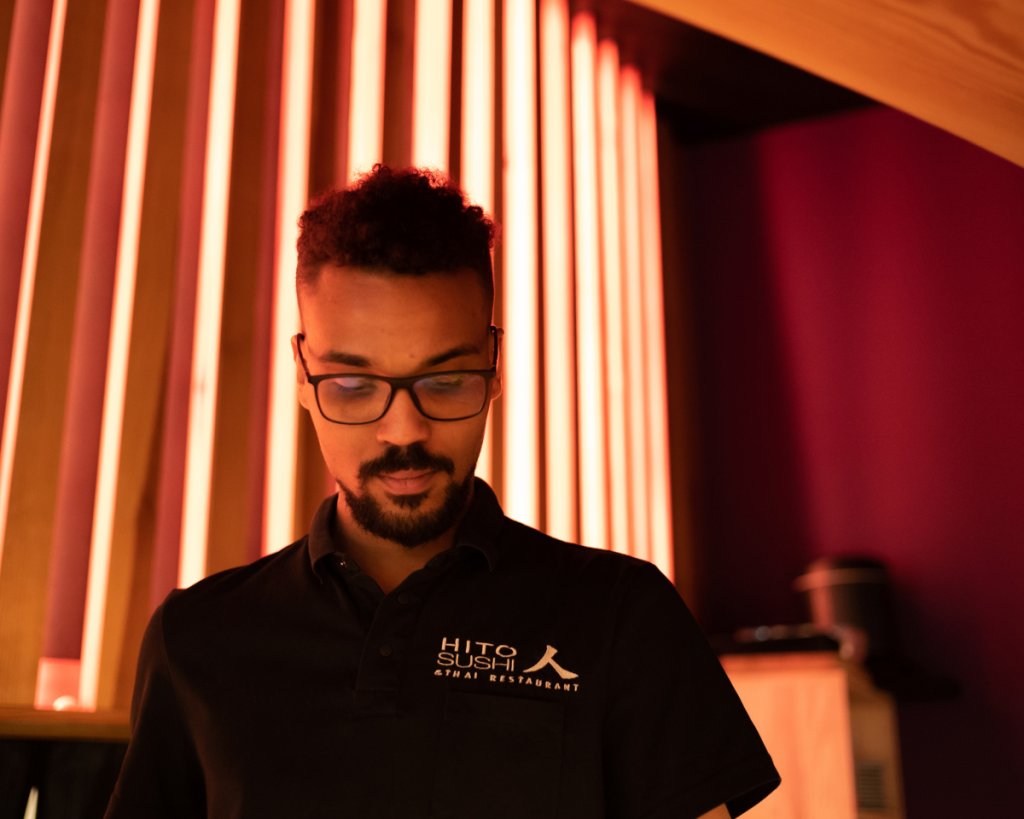
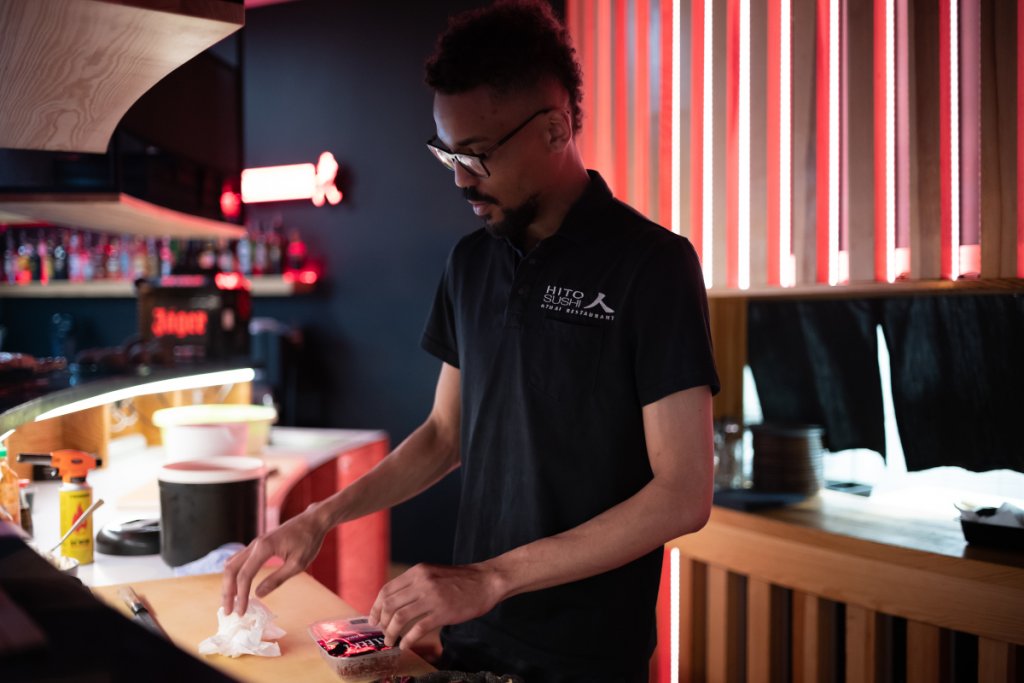
The apartment which I visit on March 10 has been decorated in a modern style, in black and grey. On the fridge hang tickets for a film music concert, on the wall – portraits of monkeys in three different getups: wearing glasses, headphones, a scarf. Two cats lounge on the windowsill. On the desk in the bedroom, exotic spiders are kept in nine large jars. Marcin began to breed them to overcome his arachnophobia. American hip-hop is drifting in the background. He also listens to classical music and R’n’B. Of Polish creators, Porkinson or Gibbs. Recently, he has fallen in awe of older Polish rap. He is especially fond of Łona and Webber. He used to listen to the music, today he focuses on the lyrics, and he considers Łona’s Conversation with God to be outstanding.
I hear:
St. Peter picked your number at random.
I can see nothing from up here, the clouds are in the way.
Visibility’s poor, so stop fucking around,
tell me what’s up.
Ah, it sucks, everyone’s nameless,
Everywhere, if not war, then at least martial law.
The powers that be are a bunch of crooks with the biggest one on top
And the Bible has long ceased to be a bestseller.
Marcin pours morning coffee into large cups and adds boiling water.
“We got engaged,” he blurts out when I ask how he is doing, and I am surprised, because he recently claimed that they do not have wedding plans and can do without it.
It was on impulse. Last Sunday, they visited her mother and then his grandmother. He saw how Monika treated them, he became convinced of her tenderness and love, her attachment to family. He saw in her the perfect guardian of the hearth. On the spot, he changed his mind about marriage. He thought that this was the moment. The only thing in the house that could be put on her finger was a rubber band. He asked Monika to marry him, and she agreed.
He claims – which I do not have a chance to check yet, because every time we meet, his fiancée is at work – that their agreement is this: they both think that the head of the family should be the man, to take care of her well-being. Monika is ready to stay at home for several years raise their children.
“What do her friends think about it?” I ask.
“One of them, older than us, shares these values. But I realize that today people simply laugh at women who put their family first. In Gazeta Wyborcza, Wysokie Obcasy, Newsweek, Vogue… All their articles say subliminally: ‘man – bad, woman – oppressed’. They also promote prostitution. Meanwhile, I believe that a woman’s sexuality is the greatest treasure she can give to a man, second only to a child.”
I ask Monika herself about it a few months later, when we finally manage to meet. On a windy and slightly cloudy August afternoon, we sit down with coffee on the terrace in an Italian café in Mechelinki near Rumia.
In the previous elections, she was discouraged from voting for Bosak by his announcements of tightening the anti-abortion law. She voted for Szymon Hołownia. And she stopped supporting him when he cried in a video during the campaign. In her opinion, a man running for the most important office in the country should not cry.
“Marcin got me into the subject of defending men’s rights and into politics. At first, it was difficult for me to accept his arguments, I used to add overlays on my social media
with the inscription ‘Women’s hell’ [a pro-choice slogan – translator’s note]. And what ticked me off the most was his talk about discrimination against men in divorces. My position was that in the event of divorce, children would be better off with their mothers, until I heard about the worldwide statistics from youtubers related to the manosphere. But in the end, he convinced me that men are more logical, rational, less moody than women. So now I think that in a relationship it is the man who should take the initiative, he should make the most important decisions. Marcin can do it with a cool head. If he takes the lead in our relationship, we will be better for it. Unfortunately, today’s women fight for power in relationships at all cost, they exalt themselves over men, but for me it is not important at all.”
Her parents separated when she was twelve years old. Her mother became the head of the family, even after her stepfather came along, and she took too much on her shoulders all her life. Monika does not want to be like her.
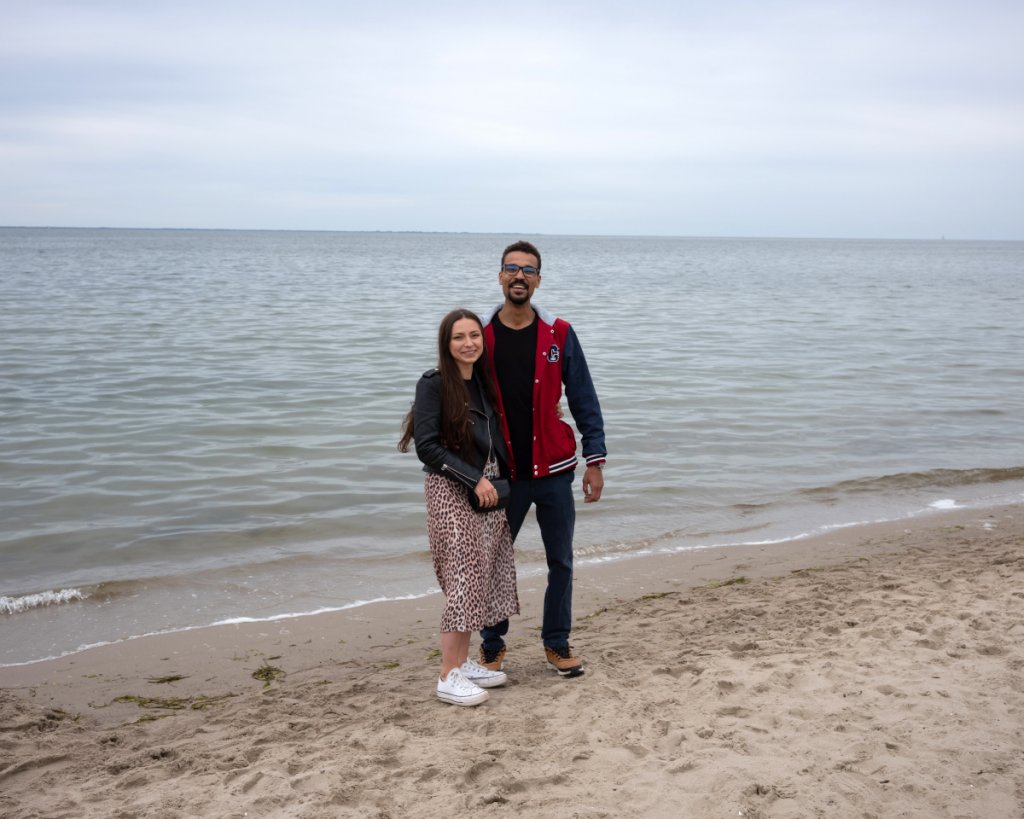
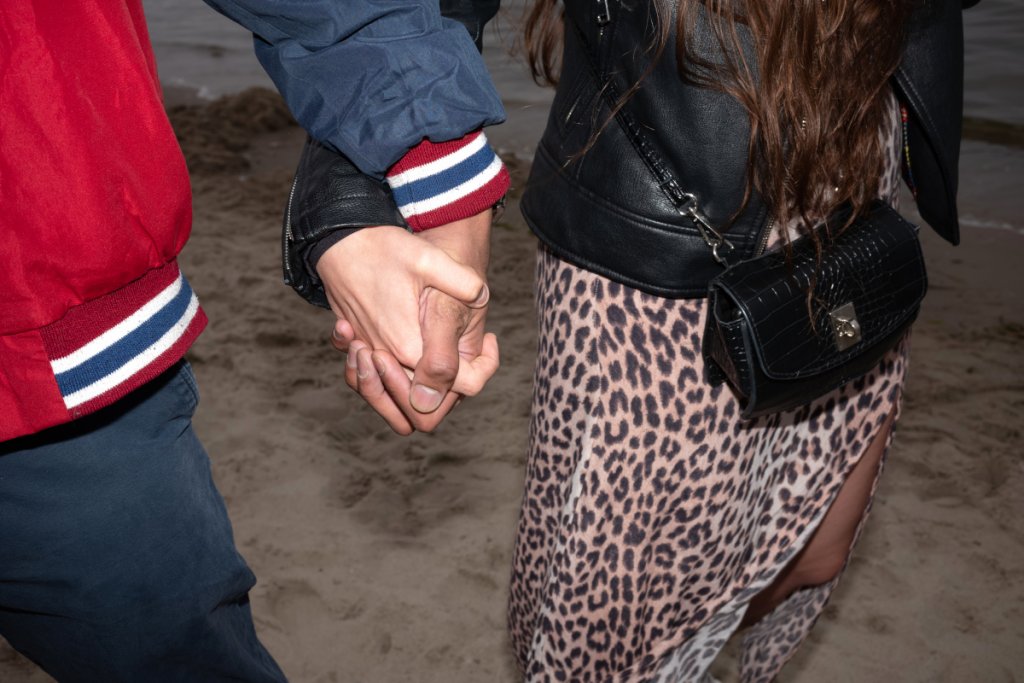
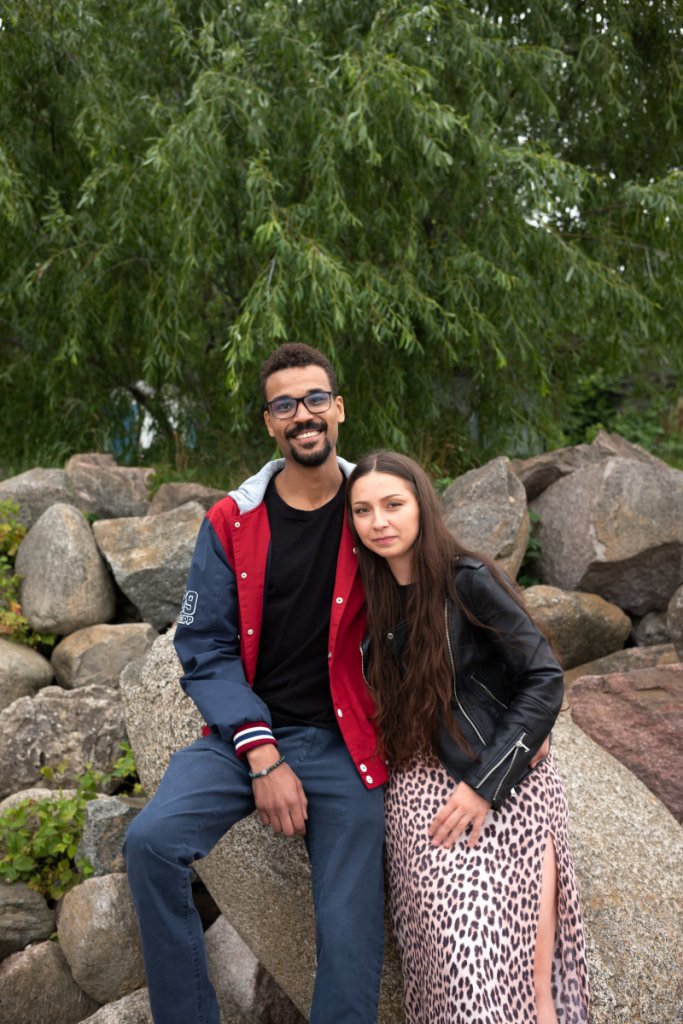
Marcin became interested in the political scene only when he began learning economics and geopolitics on his own. He voted for the first time in the last presidential election, for Krzysztof Bosak, although he knows little about the National Movement.
“It seems to me that they are a bit too fixated on history. I also don’t understand those brawls during the Independence March. People should join together, not split apart. I don’t like it at all when someone imposes their view on me too aggressively, no matter if they are nationalists or LGBT groups.”
That is why Marcin supports economic liberals and those who, in his opinion, will not tell him how to live his life. He believes that most aspects of society should be regulated by the free market.
“It is all about economic policy, to finally raise Poland economically, because it is going downhill – not about some moral issues, those are quite indifferent to me,” he emphasizes. About social benefits he says that they promote idleness in society, because the state takes from the ambitious and gives to the lazy. He is an atheist, although he has nothing against Catholicism. “I am against abortion, except in cases of rape or threat to life. My woman thinks similarly.”
“Everything,” he adds, “is now being censored. Look at the movies. Race-related jokes are cut out, jokes about women, Jews, blacks, and yet some of them are funny. And I don’t have anything against them, and not against the word Murzyn [‘Negro’] either.”
Kamila
I meet no nationalists (or supporters of Braun’s party) at the primaries in Rumia. So, I send requests to local leaders of these groups, browse Facebook profiles, write to those commenting on Konfederacja’s posts. Kamila Matolicz from Tczew, who posts a crossed-out Ukrainian flag on social media, is the only one who responds to me. She asks where and when my reportage will be published. I answer, she says that it looks to be interesting. We agree to meet in Gdańsk, but as I am sitting on the morning train on January 20, she sends me a message: “I’m sorry, I won’t be able to be there today. A virus got to me and I feel bad. Sorry. Let’s make an appointment when I get better.”
I am convinced that this is an excuse and that I will never see Kamila. Ten days later, however, on a frosty and snowy evening she is waiting for me at Galeria Kociewska opposite the railway station in Tczew and says that she always keeps her word. She explains how she went to KFC with her children and her boyfriend, ate a cheeseburger, and immediately broke out (“Because I’ve been allergic to literally everything since I was a child”), in the evening she had to call an ambulance.
She is medium-height, with loose hair, dyed black, in a heavy military camo jacket with patriotic patches and a backpack to match. A loose sweatshirt under the jacket says “Harry Potter”.
Born in Tczew, she has lived there all her life, with a few years’ break. Her three sisters left for Pomerania. Her father left her mother two decades ago, and Kamila rarely contacts him.
In middle school, she was a top book reader and a top student in mathematics (she quotes abbreviated multiplication formulas from memory), she likes to bring maths into stories about everyday life. She tells me that she is twice as old as her adult daughter, and at first I do not believe it, because she seems so young. She is in fact thirty-six and has four children: nine-year-old Natan, twelve-year-old Marika, fifteen-year-old Krystian, and her eldest, eighteen-year-old Dominika.
After primary school, Kamila picked an economic technical school. She got pregnant just before she was eighteen. Her grandmother gave her money for an abortion. But Kamila did not want to. She would never do that.
She believes that the child is not guilty of anything and in such a situation it is murder, plain and simple, not a way out of the situation. She dropped out. Dominika was born prematurely, in the thirty-fifth week.
When during one of the next meetings I ask about the project tightening the anti-abortion act, proposed by Kaja Godek, Kamila answers with certainty, “I think that abortion is good when there is a threat to the life of the child and the mother. In other cases, I do not support it. But I wouldn’t tighten the law. This Godek woman has something wrong with her head. They say that she punishes others for having to raise a child with Down syndrome on her own. I don’t know who supports this, certainly no one in Konfederacja. [Sławomir Mentzen said that abortion should be punished “somehow”, but in Konfederacja’s programme, the Constitution of Freedom, I did not find any information about the party’s position on abortion – M.W.].
Then I remember a conversation with Zbigniew Zalewski and his partner Mariola.
“So maybe they’re going to put the Internet in prison?! It is also a source of information about abortion,” Zbyszek mocked. “Godek is totally off her rocker. Shame that she got associated with Konfederacja. We should check who supported her bill in the vote. If someone from Konfederacja did, it will mean that some idiots must be put overboard.”
Almost all Konfederacja MPs of voted against rejecting the bill, which stipulated, among other things, penalty for merely informing about abortion; the only abstaining vote
being Stanisław Tyszka. I send this information to Zbyszek, who sends back an emoticon expressing disbelief or shame.
Mariola also reacts vehemently to the mention of Kaja Godek: “I do not accept this woman and I have no idea who could support her.”
“She gave birth to a disabled child and now holds the view that all should suffer,” Zbyszek expounded.
“But not all women want to suffer no matter what. Not everyone will find the strength for that.” Mariola agitatedly agrees.
When Kamila would not listen to her grandmother about abortion, she insisted her granddaughter get married, but she once again refused. Despite this, she maintained a great relationship with her grandmother.
She separated from her first partner, father of her two eldest children, after a few years. Today she says that he drank, was possessive, jealous, and would start rows. Kamila shows me a scar from when he bit her nose in a frenzy. The son no longer remembers him, the daughter does not want to know him.
Six years later, Kamila began her education in a part-time high school. But she did not pass her high school exams because she had had more children. She says she would like to go to a post-secondary school, but if she signs an internship contract she will lose the nursing benefit for her son. She hopes that thanks to the new act on supplementing the medical care allowance, this will change sometime next year.
She met the father of her younger children on an online chat. In 2012, they got married in a civil ceremony. Seven years later, they divorced. It was not until the summer of this year that the court granted her higher alimony, which she had been seeking for a long time. The ex-husband has no desire to see the children. After the divorce, he came by four times to pick up his belongings. He has not shown up since.
Kamila does not work because she takes care of her ailing sons and is afraid that at the next year’s qualification her boys will be pronounced healed and their benefits taken away.
The younger one finally managed to get an appointment with an ophthalmologist. In addition to eye problems, Natan has autism, asthma, allergy, and a heart condition. If his heart problems worsen, he will have to undergo surgery in a few years. The older, Krystian, apart from the same heart disease, has a developmental disability and congenital cataracts, has undergone four surgeries, and on top of that has postoperative astigmatism, his vision defect leaving him needing glasses for any proper vision. And he has such a strong allergy that he once ended up in hospital with anaphylactic shock.
They live on family allowance, nursing allowances for the sons, a nursing benefit for the younger of them, alimony, and child grants. It is enough to cover bills and bearable living.
When a few months later I talk about Kamila to Zbyszek Zalewski, who would abolish social assistance and even liquidate the Social Insurance Institution, he says:
“Of course, the disabled and the elderly require care. Only, with the current system, they receive too little of it. I am in favour of the sate giving basic help to people who really need it so that no one dies on the streets. And you don’t need the Social Insurance Institution for this. The problem is that by focusing on extreme examples we have created a system which pampers the idlers. I think that removing the monopoly of the state, which uses duress to take money from people, will allow for a reduction in levies from private taxpayers.”
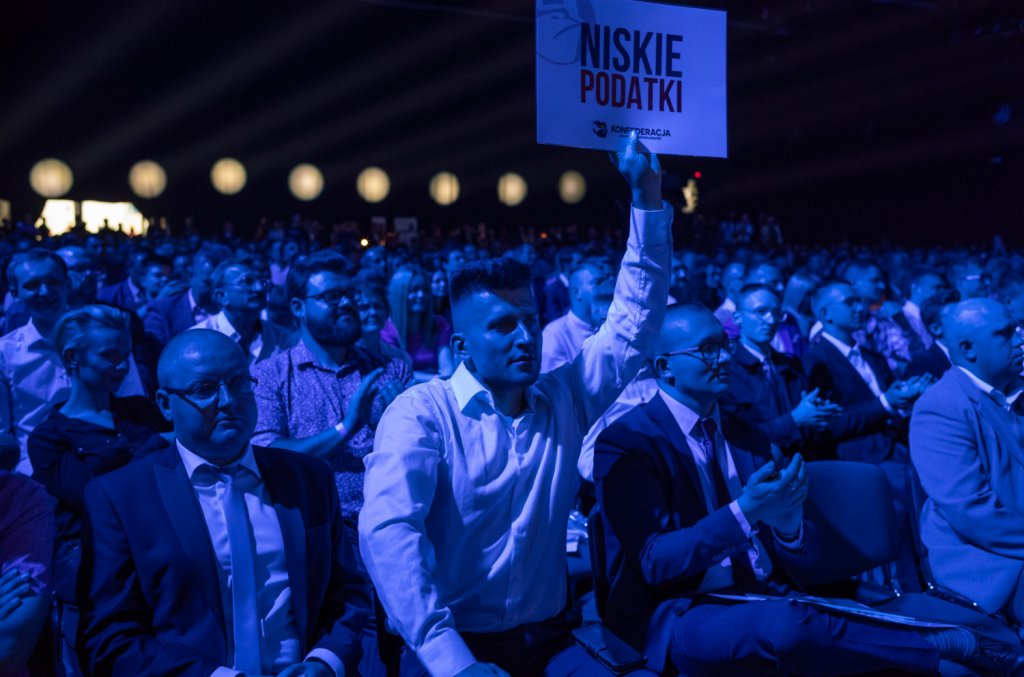
When I ask about state aid for the drugs for his disease, he answers:
“They used to cost PLN 8,000 a month, you had to pay for half a year, and then the refund kicked in. Why are they so expensive? I suppose that it is the corporations that set it that way, pharmaceutical companies, which are certainly aware that the state system will always cough up the money.”
“If it weren’t for the reimbursement, would you be able to afford this therapy?”
“At the moment, yes. If not me, my family would help me. Besides, as I mentioned, medicines would be cheaper then.”
Until September, Kamila was also entitled to five hundred zlotys for Dominika, her eldest daughter, who had recently moved out of the house and moved in with her boyfriend at her grandmother’s.
“And the worst thing is his name,” Kamila says reluctantly. She smiles nervously and hisses, “Tussssk. He denies that he is Donald’s relative. And why would he admit it?! But even if he is not a relative, the name itself makes him odious,” she says as we march through a shopping mall in search of a quiet place to talk.
Kamila is ashamed to invite me to her home. They intend to renovate, and her boyfriend does not want her to meet with some suspect journalist.
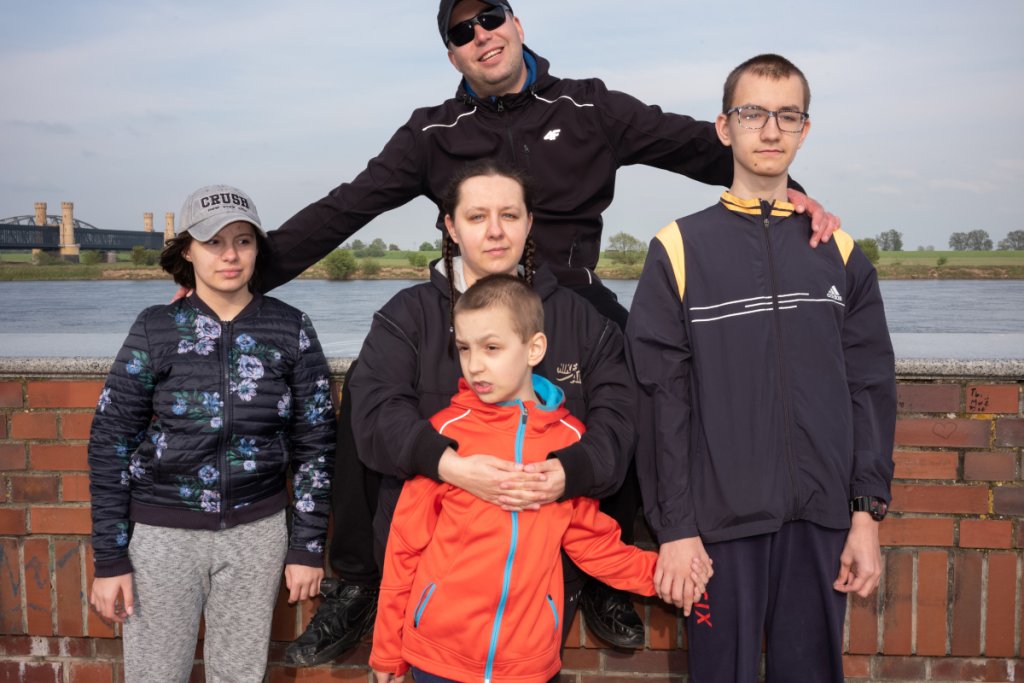
Finally, we sit down at her favourite bar near the station, order mushroom soup and a hake with potatoes and salad. I suggest a beer, but although she collects rare bottle caps, she is reluctant to have alcohol.
She has always loved books, which she will admit to me during one of the future meetings. She already has two hundred of them in the small apartment. Knowing her interest in reading, a friend has recently given her a stack of copies of “Pismo”.
“You’re kidding, this is where this report will be published?”
She loves Marcel Moss. She reads everything, including Greek mythology. Recently, she bought a series about Hitler, Eva Braun, and his other women. She paid 50 zlotys for a four-book set. Good thing there are such bargains because she could not afford so many books at normal prices. She also watches documentaries about Hitler on TV with Marcin, her boyfriend. There has been a lot of it lately: Hitler this, Hitler that, even Hitler and drugs. Apparently, they doped him up to the gills. He had the whole periodic table inside him. She also likes movies and series: Game of Thrones, The Lord of the Rings, Day of the Wacko.
Politics did not use to interest her. She did not vote in the parliamentary elections. In the local government elections, she voted for a friend who is still a councillor, but Kamila does not know who she represents. In the presidential elections, she voted on occasion: first for Bronisław Komorowski, then for Andrzej Duda (which she is most ashamed of today, but then he seemed to be the lesser evil), in the last ones – for Rafał Trzaskowski (anyone but Duda, since he embarrasses Poland in the international arena and cares more about the interests of foreigners than about the good of his own country; she calls him “Kaczynski’s puppet”).
Kamila’s attitude to politics changed only last year. The National Movement popped up on her Internet. She had not known they existed. She went to a meeting, signed up, intends to be active.
We get the ordered fish.
“Well, because in general, we, nationalists, get called fascists,” she says casually after a while.
Such associations – apart from the clashes at the independence marches – were provoked, among other things, by “Mentzen’s Five” programme announced in 2019 in Krakow during the campaign to the European Parliament (“We don’t want: Jews, homosexuals, abortion, taxes, the European Union”) or the document New Order – Constitutional Theses, prepared a year later during the presidential campaign. The same slogan about a new order was adopted in the past by many organizations of the extreme right. And despite the significant tempering of the language by Konfederacja’s presidential candidate Krzysztof Bosak, parts of the document still come off as extremely right-wing. We read in it that “the nation should be the wielder of power”, “the state should create conditions for maintaining national identity”, and “perpetuating the good of the nation must always be in the centre of the Polish state’s policy”. It also mentions “the political unity of the nation beyond the borders of countries” and the self-organization of the Polish diaspora and Poles from the borderlands.
Kamila is surprised, however, that when she admits on TikTok that she is a member, strangers immediately write that they feel sorry for her and throw a lot of obscene epithets her way.
“And how do you feel about it?”
“I don’t care, let them talk. According to them, it is best to follow the majority and not have your own opinion.”
She finds understanding in the nationalist community. During the summer holidays, she won the All-Polish Youth’s Facebook competition “I love Poland”, writing:
“I love Poland because it is my beloved country. It has very beautiful places to explore and a very rich culture and history. I was born and raised here. My children were born here. Our colours are one of the most beautiful. White and red, the colours of our people. We are a nation that can unite in the face of danger, and this is beautiful. I am proud to be Polish. I love my country. Glory to Great Poland”.
Rafał Buca.
I also write to the leader of the All-Polish Youth in Pomerania. I meet Rafał Buca in Gdańsk’s Przymorze district, in a café filled with students from the nearby the university.
I order coffee, he prefers juice. He is wearing glasses, he is not tall, much younger than I thought from the photos on the Internet. He is not even twenty-two and studies political science. He answers my questions directly and expresses his views decisively. An intellectual type, an avid reader of Zbigniew Herbert, and at the same time a fan of Mexican wrestling, lucha libre. Raised in a village near Tczew, he has two younger brothers. His parents are busy farming, not very interested in politics. However, Rafał has brought his conservative and Catholic views from home, derived, as he emphasizes, from the traditions of farmers and workers.
When he was a child, his mother used to take him to May services at a roadside cross, he was an altar boy for a decade, he remembered the parish as an institution that best integrated the local community, organizing not only religious life, but also cultural or sports life, like football. He remembers that his father voted for Samoobrona and participated in Andrzej Lepper’s blockades, and Rafał still does not fully understand what they were about.
Later, parents cast their votes for the Civic Platform (PO), for the Polish People’s Party (PSL), and then for PiS. Now, thanks to their son, they are getting closer and closer to Konfederacja. When he arrives at the university and hears his friends complaining about their parochial parents from small towns, he is saddened: “Everyone deserves a nice relationship with their children and I can only feel sorry for their parents.”
I have the impression that his story is about fear, although Rafał thinks that it is also about responsibility, care for loved ones and for the country. It was fear that made him join the All-Polish Youth.
When he was fourteen, he trained basketball in Gdańsk. He commuted by train. Europe was reeling from the attacks of the Islamic State in Brussels, Paris, and Copenhagen, and he imagined a similar thing happening on the suburban train to the Tri-City. Fear paralyzed him.
“It seemed to me that it was not very good for people to come here who could turn out to be dangerous,” he tells me, years after the events. “In Western Europe, there was more violence, and I thought that it could reach us as well.”
On September 26, 2015, two days before his fourteenth birthday, he asked his parents for permission to participate in a demonstration organized by the All-Polish Youth against accepting refugees to Poland. His parents were surprised, but they had always trusted him, so they did not protest. He went to Tczew, a dozen or so kilometres away.
He joined the All-Poles on the march and became their youngest member. In 2016, as a volunteer, he went with them to the World Youth Day in Krakow. He remembered great joy – and no less fear at the sight of snipers on turrets during the meetings with pope Francis in the meadow of Błonia. (Years later, he would admit that this fear was exaggerated.)
This topic will keep coming back in our conversations six months after the first meeting, at the beginning of the summer holidays, when protests and riots break out in Paris and other French cities.
“I don’t have that fear now. And I consider it a success of the nationalist community, because today the Polish political class is not so overly optimistic about taking in immigrants. And even if they don’t think so, they try to at least pretend. Because, you know, putting aside declarations, in practice PiS is the most pro-immigration party in Poland,” he says.
The numbers confirm this: in the last year of the Civic Platform government, the state issued 65,000 work permits for foreigners from outside the European Union (EU). In 2021, according to the Ministry of Family and Social Policy, as many as 504,000 were issued, a large part of them for people from Uzbekistan, India, the Philippines, Bangladesh, and Indonesia.
“Fortunately, we have already managed to convince people how dangerous this phenomenon is,” comments Rafał. “In Arab countries there is a huge number of rapes, women is treated like garbage there. My faith speaks about genders being equal before the law, in Islam it is different. That is why Muslims should stay at home, because they do not fit our civilizational standards; we have no cultural permission for violence, worse treatment of the elderly, women, or children, or sexual harassment. I don’t want such people in my surroundings.”
I tell Rafał about Marcin Ndzondzo from Rumia.
“It is obvious that there is a difference between individual refugees or students, whom we are willing to help, and mass immigration. In a globalized world, it is impossible to
stop migration. However, I am against the recruitment of large numbers of cheap labour, which lowers wages and imports alien cultural norms, incompatible with ours.”
On another occasion, when, in turn, I talk about Rafał to Marcin, he comments:
“For me, this is a difficult topic, because I was a refugee myself. But I do not approve of the mass admission of just anyone. Ukrainians are culturally close to Poles and their work can strengthen our economy.
Immigrants from outside Europe are a different story. A normal Muslim family professes similar moral values as a Christian one. But most of the immigrants who come to us en masse are dregs, so to say. Because when you go to another country, it should not be to change it according to your taste, but to live better, and at the same time adapt to the lifestyle of its inhabitants. My family did so, we live like other Poles. The riots in France best show how the alternative can end.”
The All-Poles in Tczew did not have their own club, so Rafał Buca set it up with three older boys. They met on Thursdays in a room by the church. One – a football hooligan type, the second – a top student and a laureate of mathematical Olympiads, the third – an introvert, he – an extrovert. At the urging of older All-Poles, he chose to go to high school. On the high school final exam in social studies – a choice they also have a considerable credit in – he achieved the best result in the school. One of the guys became Rafał’s witness at Confirmation and when the boy’s parents met him, they had no doubts that their son had found a good environment.
“A bit like scouting,” I point out. “Why didn’t you become a scout?”
“The All-Polish Youth was rebellious and this attracted me to it. We were a growing force that the liberal salon, the elites and the round-table system were beginning to fear. And when one of its representatives, some [Adam] Michnik, some [Monika] Olejnik or some [Tomasz] Lis, warned against us and the media illustrated it with photos of bald football hooligans, we wanted all the more to show them up.”
He admits that real hooligans did indeed flock to the All-Poles. “However, in the organization they became decent people, they gained refinement, they caught up with the ‘suits’, because we have plenty of those too,” he argues. “Remaining uncompromising people, they became well-behaved, able to start families, bring up children in a Christian way. Because the All-Poles do not reject anyone at the start. But the candidate must make an effort: read the works of [Roman] Dmowski, the biography of Maximilian Kolbe, our patron, or the history of the National Movement, to discuss them, to understand them, to pass the exam in the form of a conversation. And to those who do not want to read, we say goodbye. Not everyone passes the exam either.”
Rafał has a girlfriend, but he doesn’t want to tell me too much about her or introduce her to me. Same age as him, she is in film studies. He does not know who she voted for in the previous election (“Actually, now I think I could ask her”).
“But she also has conservative views,” he says.
We end our long morning conversation, because Rafał is going for a beer with his friends.
“Do you have a favourite pub?”
“We go to different ones. I will not reveal the places we go to drink.”
Gabriela i Kazimierz
They come to Nowa Nadzieja’s meeting from Kartuzy. They arrive as one of the first. Instead of sitting down, they shift from foot to foot and look around the room, conspicuous because they are both pensioners among young people. A really rare sight here. Sławomir Mentzen, the new leader of the party, openly admits that Nowa Nadzieja attracts the youngest voters, and does not even actively seek pensioners.
When I visit them at their home for the first time at the beginning of February, it is snowing, the streets of Kartuzy are wet and cold. I am staying at the Miłosz Hotel, and Kazimierz Gliniecki does not want to hear of me walking from there in such weather. At nine o’clock he pulls up to pick me up at the hotel. From a cold and sterile car, we enter a cozy and meticulously clean apartment on the first floor of a multi-family building. Three rooms have been converted into two and the living room is large and bright.
“Spacious, isn’t it?” Gabriela rejoices as I admire the alteration that her husband came up with immediately after buying the apartment in 2001.
Above the door hangs a solid wooden cross. On the floor, a plaster angel holds a red candle in his hands, which smoulders with a delicate flame. Two display cases with glasses and cups. A large mirror. On a chest of drawers lies the latest issue of “Polonia Christiana” (a conservative-Catholic bimonthly published by the Father Piotr Skarga Christian Culture Association), they also watch BanBye, which was created after the YouTube channel “wRealu24” was blocked for terms-of-use violations.
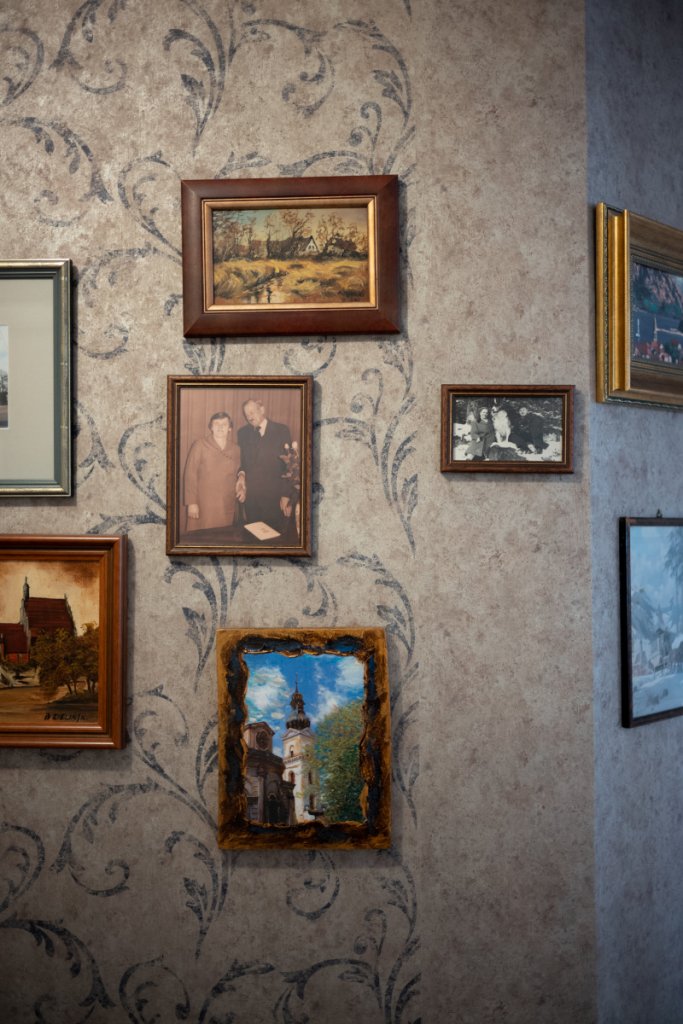
Kazimierz brings coffee – they drink natural coffee only, from the grinder. Gabriela takes a cherry pie out of the oven.
They have no children. Born and raised in the vicinity of Bydgoszcz, they moved to Zwierzyniec and Biłgoraj in the Lublin region for many years, when Kazimierz was offered a management position in the railways. They settled in, met people with whom they keep in touch to this day.
The people there were somehow better, the food was healthier, the environment less decimated. You would see a pheasant cross the road, a whole lot of animals, not like here in Kashubia. They moved here in 1985, again for work, and still have not fully got used to it. Because with these Kashubians, they say, you have to be careful, they will never accept being wrong, and if they have to admit guilt, they blame someone else.
The Glinieckis – as I will find out in the coming months – treat you like family. Before one of my next visits, I spend the night in downtown Gdańsk, the morning train to Wrzeszcz is delayed, and the passenger train to Kartuzy leaves as I watch. I call Kazimierz, I apologize, and he comments that this is what you get when you travel by state (i.e. PiS) means of transport. And again he offers to pick me up from the station by car. When we enter the apartment, both of us cold, we can already smell the food and hear a warm welcome from Gabriela.
“Frysztyk [breakfast] is coming!” announces Kazimierz and brings out the omelette with chives followed by delicacies which his wife serves out in the kitchen: sprats, bream in vinegar, white cheese, brine cheese, oscypek cheese, home-made bread.
“Cottage cheese from the countryside, all natural,” Gabriela praises. “This one’s brine, and that one comes from Zakopane,” Kazimierz explains.
“Go ahead, eat, everything is healthy here,” Gabriela urges. They could talk about organic food endlessly.
“So you waited this long for me with breakfast?”
“We haven’t eaten for a few days now, since you called to say you’re coming, just waiting,” Kazimierz jokes in his own style.
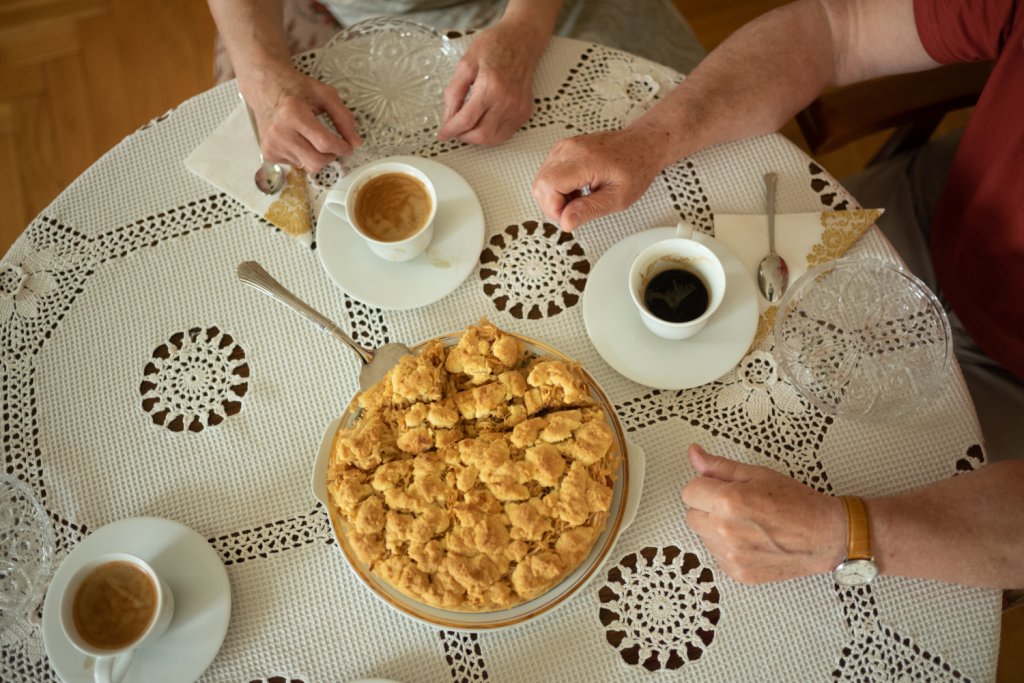
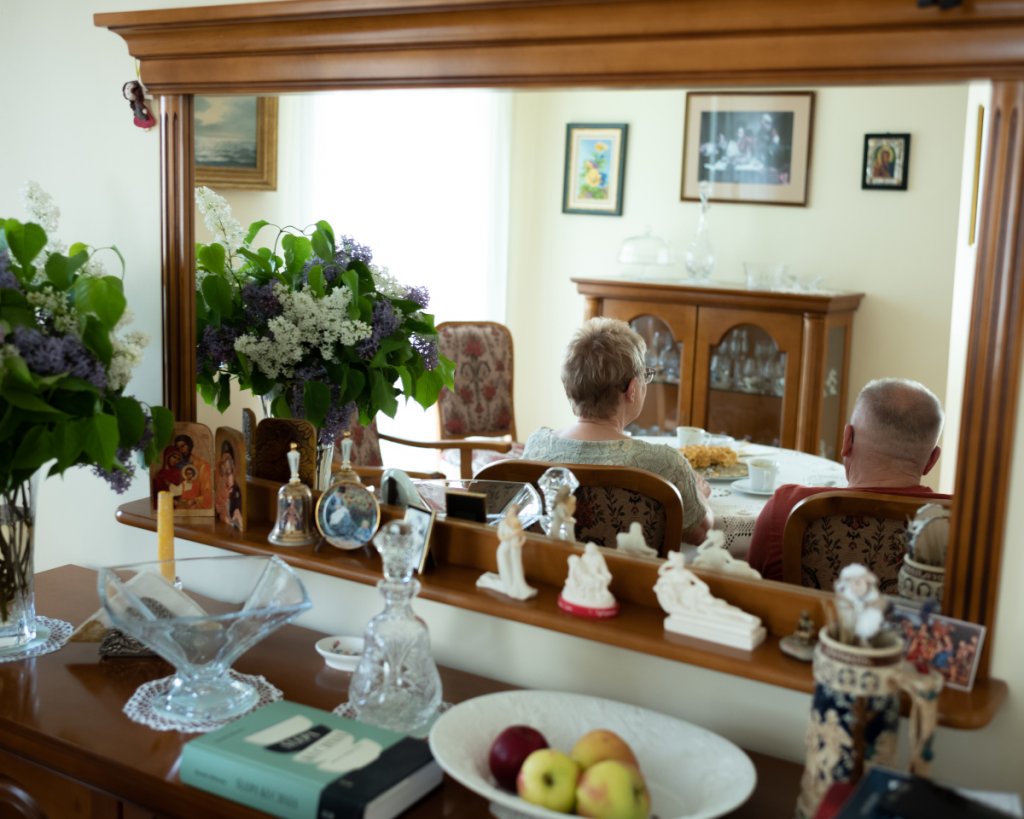
I feel that my visit really makes them happy. Gabriela bursts out laughing and corrects:
“We ate much earlier, at dawn we were already on a walk.”
Because I visit the Glinieckis on March 8, I have brought Gabriela a box of chocolates.
“My wife doesn’t celebrate Women’s Day!” Kazimierz stops me, but finally allows me to hand over the chocolates. “We do not recognize this holiday. If I ever celebrated it, it was during communism. And it was a day off for men. You came home late, a broken carnation in hand.”
The Glinieckis have a set opinion about communist times and what happened afterwards. About Solidarity too.
At the beginning of the 1980s, an old stationmaster in Bełżec explained what would happen: “Do not delude yourself that things will get better. The same people will stay in power, only they will call the system different. I’m already not long for this world, but you will see.” And according to Kazimierz, he was right.
“What happened then was one big robbery,” Gabriela agrees. Her supervisor, a recent activist of the Polish United Workers’ Party (PZPR), had tried to persuade her to join Solidarity, to which Gabriela, mustering up her courage, replied: “I will sign up when real Solidarity comes, not a red one painted over.”
“And now there is nothing left,” adds Kazimierz. “But if in 1989 there had been a real change, we would be the richest country today, at least in Europe.”
As we are eating natural cottage cheese in Kartuzy on a March morning, he says:
“On Tuesday we were at a cousin’s funeral, and earlier a friend’s in Rumia, born 1949. He came back from his bike ride feeling woozy, went straight to the hospital, and a week later he was dead. He got inoculated with that preparation of theirs. They said it was sepsis because they had to say something publicly, but on the death certificate they probably put a special code. Because there is no way that people just die so suddenly.”
Kazimierz gives me a plate of cheese, he does not have to persuade me, the brine cheese is fantastic.
“People asked at the funeral what he died of,” he continues. “So I explained to everyone that he had allowed himself to be jabbed, so he died. They are all jabbed too.”
“The last two years have been humiliating,” Gabriela recalls. “I went to see a dermatologist. The doctor tells me to put on a mask, and I tell her no. And you know what? She stood in the doorway and didn’t let me in. I told her: ‘What are you doing to us?!’”
“So we stopped using these medical dealers, or, as I call them, primary careless physicians.”
“And how did you survive the pandemic?” I ask.
“As you can see, normal,” Gabriela smiles and explains: “We eat high-energy foods. We don’t eat processed food, we buy everything in the villages and we prepare it ourselves. The bread is baking right now. You’ll take some home.”
I ask them what they think would be the ideal scenario for Poland after 1989, and Kazimierz explains:
“A military coup, at least ten years of dictatorship, liquidation of the Social Insurance Institution and all state interference and dealings, and above all, a complete removal of people of that regime from power. Then a new order, in which private property is paramount, and the state’s participation in the life of society is this tiny,” Kazimierz brings his index finger and thumb close together.
“Is there an example of this anywhere in the world?”
“Augusto Pinochet tried, but the meddling leftists also prevented him from succeeding.”
Four months after our first meeting, we drive along a smooth asphalt road between rolling hills of greenery alternating with yellow carpets of flowering rapeseed and blue lakes. Gabriela and Kazimierz Gliniecki melt in admiration of the Kashubian landscape, and every now and then he shows her the changes that have taken place here since their last visit, tenderly calling her “Gabi”.
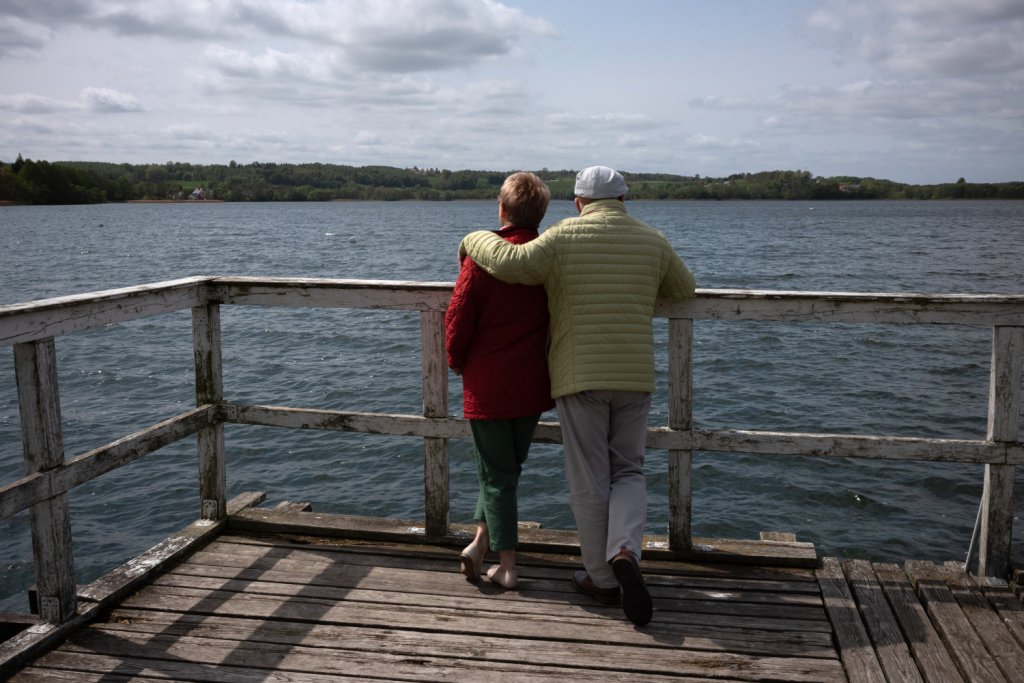
Kazimierz looks around the landscape and, pretending to be serious, mocks:
“We don’t have any mines anymore, do we? Unnecessary. After all, our country is so fortunately located that we have strong winds every day, so there is nothing to do but build windmills. In addition, the sun shines brightly all year in our country. So the photovoltaics are a no-brainer. In this respect, we are a sensation. And the overvoltages have already started, the voltage jumps from 220 to 260 volts and damages house appliances. This is just the beginning. Fires will be starting, people will lose their homes.”
Although green energy sources seem suspicious to them, preserving nature is close to their hearts. From autumn to spring, they buy 20 kilograms of oats every month, get up at dawn every day, take almost half a kilo of oats and go to the lake to feed the ducks. I watch a movie on my mobile phone: the rising sun is reflected in the water, dozens of ducks flock in.
Rafał
I meet Rafał Buca not only in Pomerania. Sometimes we sit in a café near the Sejm in Warsaw. He comes here as an assistant to Michał Urbaniak, a former All-Pole, currently a member of the National Movement.
On 7 March, on my way to a meeting with Rafał, as I pass the Sejm, adults with disabilities and their carers are protesting there. They submit a citizens’ bill on the increase of the social pension.
“I would increase these benefits, because I think that this is one of the most urgent issues now,” says Rafał. “The only thing that puts me off is the style of MP Iwona Hartwich,
such an angry KOD-er [i.e. a member of KOD, the Committee for the Defence of Democracy – editor’s note], it is simply repulsive to me.”
In its electoral programme, Konfederacja writes about breaking the monopoly of the National Health Fund (NFZ) and basing the health care system on market competition. And, of course, about lowering taxes. I ask Rafał about this economic liberalism, which is Nowa Nadzieja’s foremost tenet.
“Extreme ideas, such as the liquidation of the National Health Fund or the Social Insurance Institution, would be completely unacceptable to me. I appreciate the social benefits we have in Poland. I really think it’s great that we have free education, free college, and saying that it lowers the level of education is nonsense. I could never pull off paid studies. And not because I’m stupid or lazy, but simply because I wouldn’t be able to pay. So instead of me, they’d accept some spoiled, pretentious young man, probably from a big city, who got everything from his parents and thinks he is entitled to everything, and who might be less capable than me. In my opinion, a system in which access to education or health care is determined by the content of one’s wallet would be absolutely disgusting.”
Rafał sits in front of me wearing an elegant, cream turtleneck. Although he had been working in the Sejm since that morning and had not eaten anything for many hours, he shows no fatigue. We order pizza.
He had come for three days. His duties are manyfold; he is working on a law obliging entrepreneurs to use less plastic (Konfederacja intend to add a requirement to create recycling collectors and return machines for used bottles in Poland), he handles social media support, organizes school trips.
What are the students most interested in?
“They usually ask about MP Mentzen. Recently, my brother celebrated his eighteenth birthday. When his colleagues found out what I did, they immediately wanted to know if I knew Mentzen.”
Sławomir Mentzen mocks everything and everyone, while dynamically developing his brand and political concepts. He is quickly becoming the king of TikTok; in March, when I sit with Rafał in front of the Sejm, his videos’ view count sits at 23.9 million. The record holder (2.3 million views) is a post entitled How to Live – Lesson No. 1: of whether milk with cereal or cereal with milk is superior.
“Many young people,” Rafał notes, “are starting to ‘speak Mentzenese’. It reminds me a bit of those life coaches who say: ‘Make money, forget your family if they don’t support you in this, and don’t even visit for Christmas’. A promotion of extreme individualism. I think this is dangerous because it leads to social atomization. And community and solidarity are important; besides, I’m not a fan of an overly liberal economy.”
However, he realizes that Mentzen is great as Konfederacja’s co-leader because he finds common ground with ordinary guys who are not interested in gender theories, prefer to earn money, start a family, plan holidays, drive a petrol car.
And with clear disappointment, he tells me the story of an interview he has given to “Gazeta Wyborcza”:
“We were annoyed in Tczew by smog and stoves fired with random garbage. We decided to organize an educational campaign with the All-Poles. ‘Clean air, healthy nation’, something like that. We hung posters, we wanted to emphasize that the national idea is also pro-ecological and that environmental protection does not have to mean radical ideas like giving up eating meat. And I remember one of the journalist’s first questions was: ‘Why did you come here by car? And an old petrol one?’ I was nineteen at the time, it was my parents’ car, I couldn’t afford my own. So I said: ‘You know, my town is a transport desert and I simply have no other way to get to the city’. And she said: ‘Do such places still exist?’ I don’t know if she was mocking or serious. When asked if I didn’t mind burning coal in the stove, I said that we had a coal stove at home, it had been there for years and we couldn’t afford to replace it. My grandparents’ place is the same, replacement is a huge cost. I was quite open, you can see for yourself how I try – regardless of the difference in views – to explain my opinion, and this woman was nice, too. And then they hung me out to dry…”
The text on the paper’s website reads: All-Pole in Tczew fights for “clean air and a healthy nation”. However, burning coal does not bother him.
“In the article, I was described mainly by my surname alone, in a context that made it sound like ‘buc’ [meaning ‘prick’ – translator’s note]. They made fun of my parents’ old car. It was horrible, I felt a great injustice. And there were photos of football hooligans, with flares, in sagging tracksuits; I thought to myself: ‘Damn, woman, you saw me, I don’t look like that!’”
The text about environmental protection is illustrated by a photo of a masked football fan with flares and a sweatshirt with the inscription “Death to the enemies of the homeland” and several photographs of nationalists with torches. There is no portrait of the only protagonist of this reportage, a student pursuing two degrees at the University of Gdańsk, with a gentle and intelligent face behind his glasses.
Profile of the average Konfederacja voter
Down with the Ukrainian flags
The next day, I set off to Pomerania again to meet Kamila Matolicz. I arrive in the evening and it is difficult to find an open place in Tczew. We wander the wet and cold streets in search of a warm place to sit, and Kamila scolds me not to cross at a red light.
We end up in a round-the-clock kebab bar run by Asians. I was upset that they didn’t want to give me a receipt for a business expense. Kamila talks me down: if they can’t, they can’t. She takes off her military jacket. Today, she is wearing a sweatshirt which says: “We remember – 1944 – Warsaw Rising”. She got it from her boyfriend. She wears it with pride, because every event in the history of our country is important to her as a true patriot.
Recently, Kamila went with nine-year-old Natan to a demonstration demanding the removal of a monument to Soviet soldiers. Photos of her, the only woman among tall young boys, most of whom could be her sons, can be seen on the All-Poles’ social media page.
“Although recently there was one more girl, Natan’s favourite day-care lady; it turned out that she is the fiancée of the head of All-Polish Youth in Tczew,” she says and complains that not much is happening in the Tczew Konfederacja and National Movement branches. She fears how the party will fare in the elections. But she managed to convince her sister and brother-in-law.
Kamila is becoming more and more active every month. In the spring, she shows me some stickers. “For now, I don’t have much, but I’ll scan, print and stick them around. Oh, this one is the coolest, with Roman Dmowski (‘Roman Dmowski the Liberator of Poland’).” On the others, I read “Stop LGBT aggression” or “Please… fight for me, I have no voice (foetus)”.
In May, I meet her boyfriend, thirty-two, a native of Gdańsk, whom she met on a dating app. Marcin explains that he has always been a “street patriot”, but it was only at Kamila’s instigation that he joined the National Movement.
“It’s better to give people a fishing rod [than a fish], I’ve always thought so,” Marcin explains to me his life philosophy and political beliefs. “I have never had the opportunity to develop my potential because some people have always strived to block me.”
“Because if you don’t have connections, you have nothing,” Kamila nods to him, and he picks up: “Exactly! And where I did find work, I didn’t work for too long, because they saw that I was too smart and tried to take advantage of me. Now I’m temporarily unemployed.”
Marcin takes care of his ailing father (who, as he claims, after forty-five years of work, got cut off from his pension by the Social Insurance Institution). For his birthday he got dumbbells from Kamila, they were on sale, 60 zlotys, ten kilos each. He exercises. A few people have already told him that he “packs a punch” (“has so-called predispositions” – corrects Kamila) and that he should sign up for kick-boxing because he is also good with leg work.
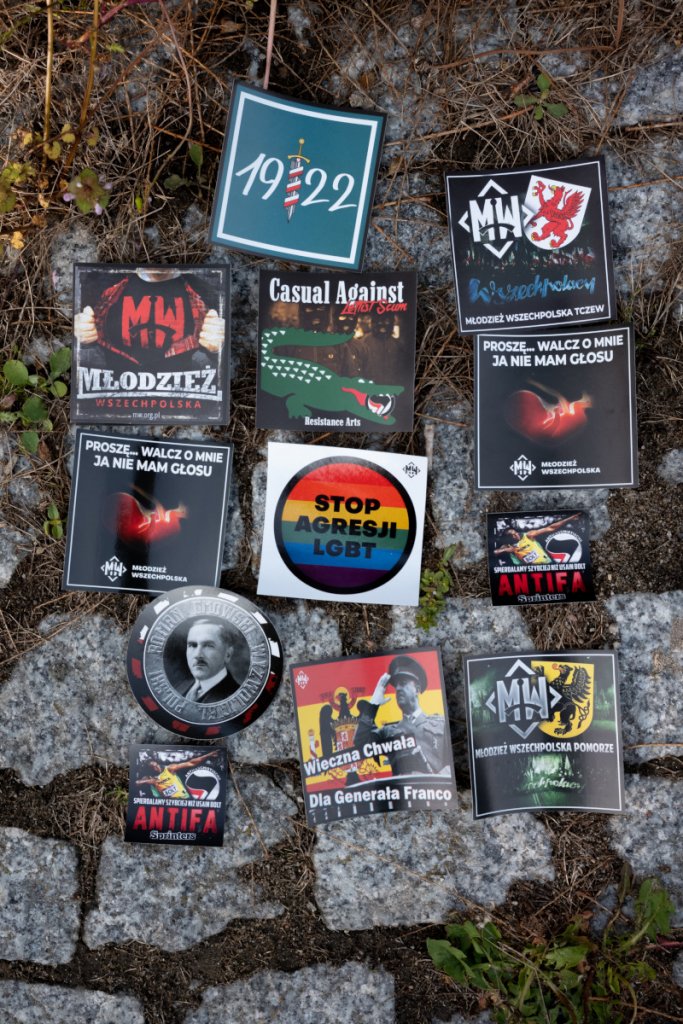
We are talking about the Mayor of Gdańsk, Paweł Adamowicz, whose murder prompted Kamila to express her sympathy on social media. “Because he was doing something, at least, not like this bitch now [Aleksandra Dulkiewicz, the current mayor of Gdańsk – editor’s note], who finds money for LGBT people, but not for the necessary things, takes away people’s apartments and gives them to Ukrainians,” Marcin compares.
Kamila and her boyfriend decided to take matters into their own hands. They walk around Gdańsk and tear down flags.
“When I’m at the Madison [the shopping mall – M.W.] and there’s no one around, I pull them down,” she told me bluntly during our first meeting. “I tear down the Ukrainian one, the Polish one stays up. They hang a new one in a moment, and I tear it down again. And on, and on. Now they have stood someone there to guard these flags. It’s a pity that I can’t reach the ones higher up.”
I ask what irritates her most about supporting Ukrainians. She mentions that they have become more important for our government than Poles; they get free meals, while at the same time the Polish homeless can’t; they have benefits, they can go to the doctor without insurance and they have access to specialists faster than Poles. And all this from our taxes. And also that there are baskets set out for people to donate food products for Ukrainians everywhere, and no one collects for Poles anymore.
What annoys her the most is “giving away apartments to Ukrainians for free”, she sees ads for free apartments on sales websites every now and then. What she talks about is a benefit of 40 zlotys per day for owners of housing premises who provided accommodation and meals at their own expense to Ukrainian citizens. It was being awarded from the beginning of the Russian invasion for the period of up to 120 days and has been extended until March 4 of the coming year.
“Poland cannot afford to support our own unemployed, less so the ‘Ukrs’. POPiS [the two dominant parties, PO and PiS – translator’s note] thinks that it can print money endlessly, but at this pace we will be a second Greece,” she frowns.
She mentions that she is unemployed and in need herself.
Kazimierz Gliniecki also has an opinion on the refugees from Ukraine.
“You know,” he explained to me during one of our first conversations, “you can accept refugees, but you cannot, so to speak, give them special privileges. We stopped going to our church because they no longer pray on the rosary for anything except for peace in Ukraine. ‘In Ukraine’ [w Ukrainie], not ‘in the Ukraine’ [na Ukrainie],” he stressed. “There is no peace ‘in the Ukraine’ at present, but about ‘in Ukraine’, I couldn’t tell you. I also don’t know how it is in ‘the Hungary’ [na Węgrzech]. Because you can’t go to ‘the Hungary’ anymore, you can only go to Hungary [do Węgier] now. And be careful, it’s important, because the border guards won’t let you through, if you say ‘na’. That’s what things got to. And at the church, they should pray for peace in the world, and not go on and on about the Ukraine.”
Supporters of Konfederacja’s libertarian faction apparently do not share these views.
“Let’s face it, Konfederacja has always had pro-Russian tendencies, and the Russian invasion of Ukraine forced them to make some hard choices,” Zbyszek’s friend, a Korwinist whom we will soon get to know better, tells me. “I was mostly worried about the National Movement and I must admit that they passed this exam, kept it cool, they do not repeat the Kremlin’s narrative. But I must say I was disappointed with other politicians: Korwin-Mikke, who fortunately is already retiring, and Braun. I do not know whether they are simply looking to be provocative or maybe they are not aware of the scale of the threat. And on top of that, one of the National Movement’s most prominent politicians expressed the opinion that the economic crisis has its advantages, because Ukrainians will finally go home. What economic ignorance!”
“It’s simple: these people work here and even if they send some of their savings to their families, they live here, spend here,” Zbigniew Zalewski sums up briefly. Marcin Ndzondzo talks about his good experiences with Ukrainian colleagues: “We have a lot of jobs to go around, this is good for Poland.”
Kamila is still embarrassed to invite me to her house, but in May I convince her to do part of the photo session there. When we visit her together with photographer Agata Grzybowska, she apologizes for the scuffed linoleum and slightly peeling walls, covered with photos of landscapes and animals. One room has a modest wall unit, a large trash can, a television; the second – children’s bunk beds.
For the first time I see her not wearing patriotic clothes. She wears a navy blue skirt and black tights, and a T-shirt with seaside houses on it. She carefully styles her long hair, which is usually more wild.
And then we all take a drive to the playground.
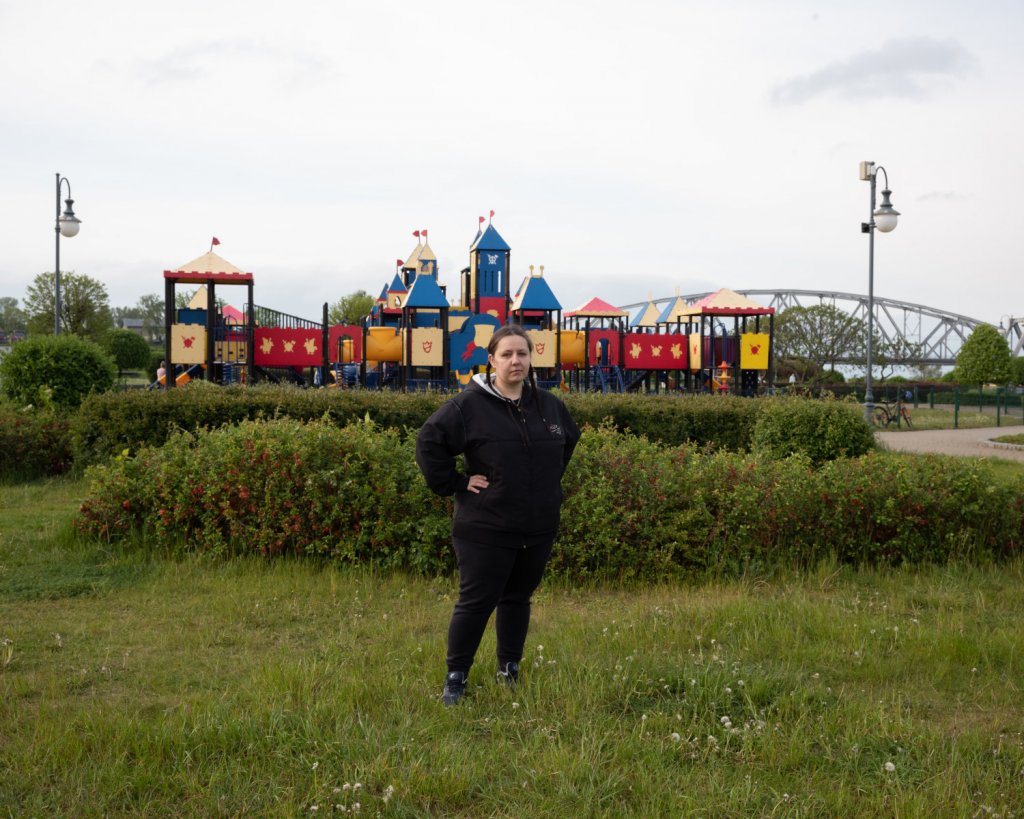
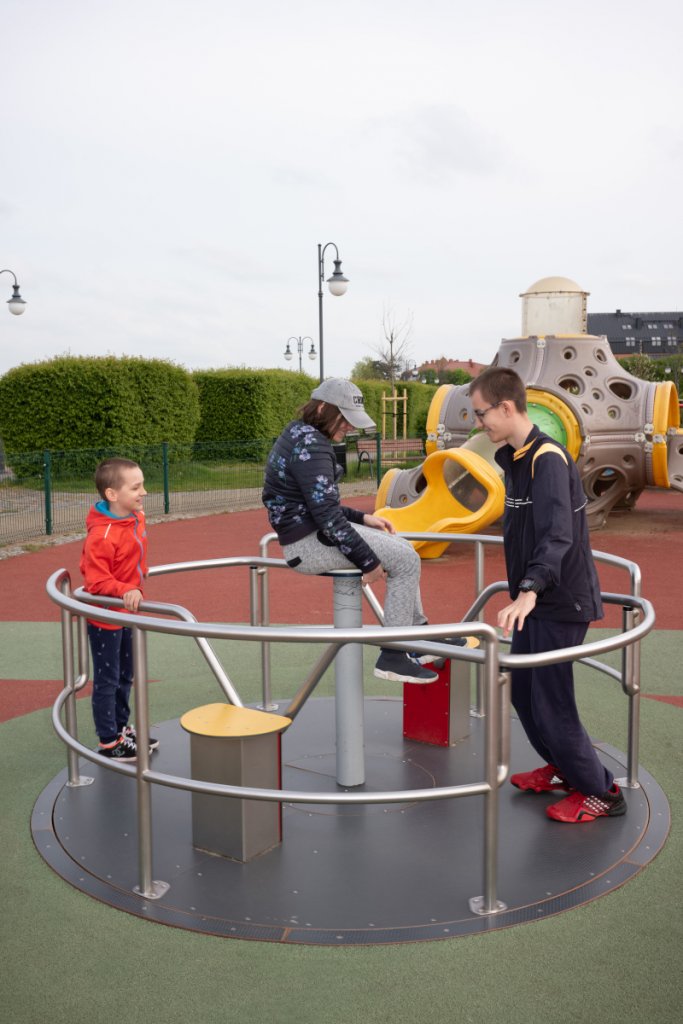
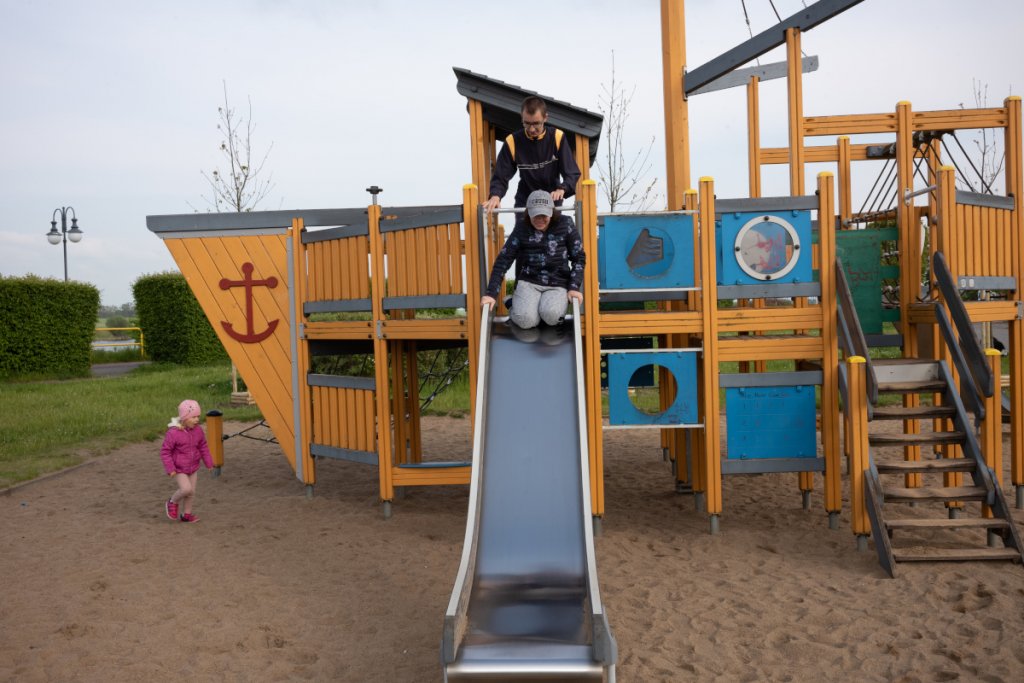
“Here we are,” Kamila rejoices. “All washed, like new! And that’s one thing I was striving for, settled.”
She wants to become a councillor. Tczew nationalists tapped her to run because she is the only woman among them. She has ideas on how to attract voters; intends to renovate the hospital gate, because it looks dingy, to put up more garbage cans, as well as stalls for women to feed and change babies. For starters, she got the rubbish, dirt, and vulgar graffiti removed from the playground on the Vistula Boulevard.
“And do you still tear down Ukrainian flags with Marcin?” I ask.
“For now, they stopped hanging them, I don’t have to.”
Piotruś bar
In May, Zbyszek Zalewski and his friends come to Warsaw for the Speedway Grand Prix. I inquire if we can all meet together.
“Together. Like that funny party [The name of the leftist party Razem means ‘Together’ – translator’s note],” he texts back and adds a smile emoji.
I met his colleague Michał Jankowski during the primaries in Rumia. He is the one who criticizes pro-Russian statements and economic ignorance of some of Konfederacja’s politicians. He is a thirty-three-year-old mathematics graduate whose job puts him on the road between several cities in Poland, Slovakia, and Austria. The first political meeting in Michał’s life had been one of the Pomeranian National-Radical Camp (ONR) when he was a high school student. In the subsequent presidential election, he voted for Marian Kowalski, then of the National Movement (about which he does not have a good opinion today), and finally helped KORWiN party in Gdańsk.
For our current meeting he chooses Piotruś Coffee Bar at Nowy Świat Street in Warsaw, run by the legendary Mrs. Irenka for almost four decades now. He says that he likes this place, and often comes here for a beer when in Warsaw.
Lace tablecloths, upholstered chairs, décor from forty years back. Zbyszek looks around and asks: “Why did you pick this place? Because they are so traditional?”
A rainbow flag flies from a building almost opposite. I joke that he picked it because the headquarters of the Razem party are right over there. Zbyszek grabs his head.
Michał laughs. “This is exactly what I like about libertarians: that they avoid ideological topics. I’m a lukewarm conservative in this matter, an anarchist for some, a libertarian for others, but I just don’t butt into other people’s lives. I don’t understand making a fuss about some LGBTs, because how many lesbians and gays do we have in Poland? Half a million?
And 38 million people have Polish zlotys in their wallets. So which issue is more important?” asks Michał.
He emphasizes that he is not a supporter of registered same-sex unions; after all, they are completely legal already. But he also does not mind, if people want to enter into them so much.
Since the conversation turns to sexual minorities, I am reminded of an incident from the university, which Rafał Buca told me about:
“During classes, in front of the entire auditorium of students, one of the lecturers told me that his daughter had walked in the equality parade. He asked if I went too. I said that I don’t quite agree with the demands of this march, so I did not go. And he said: ‘But I saw you at a counter-demonstration. So, do you think my daughter is some kind of a freak?’ I don’t remember what exactly I said then, I don’t want to lie. I certainly explained that we went there with the tenants from Mniszki Street. There’s a mural of Mayor Adamowicz on one of the buildings there, it cost 100 thousand zlotys! While the tenants of the dilapidated flats do not even have toilets. For me, this is an extravagance of the liberal elites of Gdańsk; at the expense of poor people, they make big gestures, signalling their virtue.”
“And do you think your lecturer’s daughter is a freak?”
“I wouldn’t call her that, because I don’t know her. But various people appear at these parades, including a lot of freaks, very disturbed people, people who have problems with their sexuality,” Rafał opines and caveats that he has no homosexuals among his immediate acquaintances, so it is difficult for him to say what such a person feels. “But I’m not a supporter of penalizing homosexuality or even closing gay clubs – that would be state overreach. What I am against is rainbow propaganda, instilling in children that homosexuality is an option for life. Because I really believe that there must be some kind of therapy that could help these people, maybe not all of them, but some for sure. I feel sorry for them, I don’t feel hatred.
However, I think that homosexual relationships must not be affirmed, because it is not an equal family model.”
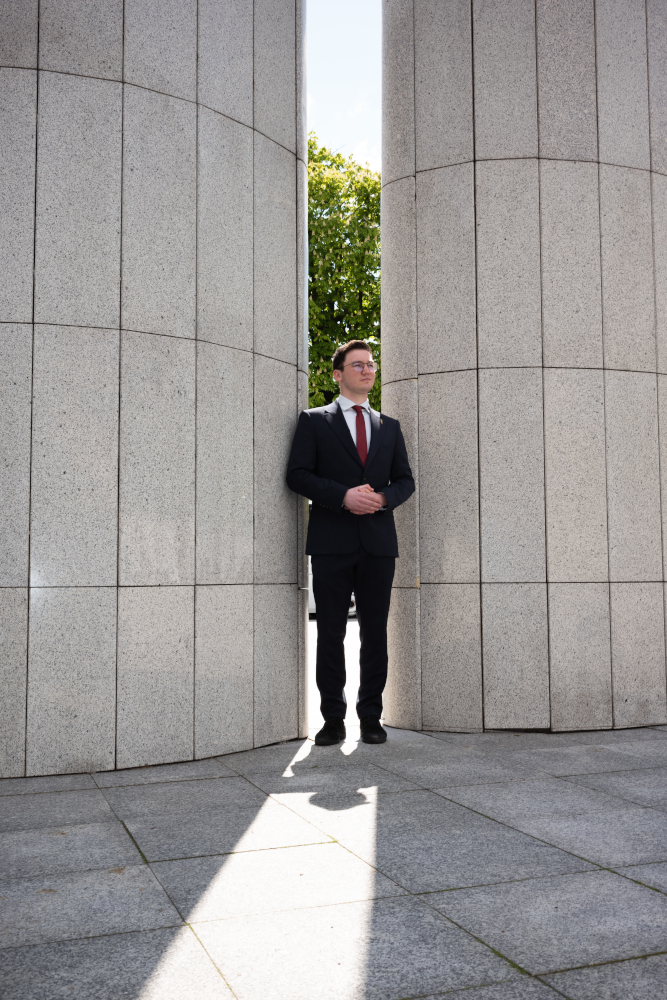
During one of our meetings, Kamila Matolicz also addressed the nationalists’ approach to this issue:
“My friend said that if I don’t tolerate LGBT and others like that, I’m a nazi. It seems to me that she voted for PiS because she is so strange. Or for Civic Platform, because she has a lesbian daughter. And she allows the fifteen-year-old to live at her house with a girlfriend! Fortunately, this isn’t happening here, but in Katowice.”
A few days later, when I visit Zbyszek and Mariola in their apartment in Rumia, I tell them that the Piotruś has been a favourite place for lesbians and gays for decades. Zalewski does not believe, initially, and finally blurts out: “But it was really nice there!”
When he later passes on the intelligence, Michał is a bit embarrassed.
For tradition and order
The fact that ultra-liberal views are held by thirty-year-olds, such as Zbyszek, Michał, or Marcin Ndzondzo, is not surprising. But I’m surprised when I hear the same thing from Gabriela and Kazimierz Gliniecki, who are not only more than twice as old, but also receive benefits from the socialist pension system and public health care (as much as they complain about the “pretend pandemic”).
For years, they were loyal voters of Janusz Korwin-Mikke. Furthermore, although they speak negatively about the communist times, they fondly remember Mieczysław Wilczek, who became the Minister of Industry at the turn of 1988 and 1989.
“Oh, what a time!” they say to me often “In the communist era. The old one, not the current. Because the new communists, the Law and Justice party, are even worse than the previous ones.”
It is surprising that a member of the last communist government is remembered so fondly by supporters of Konfederacja – although they point out that it is only because of his approach to economics. And not only by those who remember his rule, but also young people, who were often born long after. Like Zalewski, who told me during our first meeting that if the Wilczek Act had survived longer, Poland would simply be flourishing now. “How I regret that I didn’t enter the job market at that time,” he said wistfully.
Kazimierz, twice his age, unconsciously almost echoes him:
“After all, as soon as the Wilczek Act came into force, everything that was state-owned began to lose ground to private enterprise. It was immediately clear which worked better. And then the whole Solidarity movement began, to stand up for socialism. And yet that was the only moment to put the country to rights.”
Korwin’s party was succeeded by Nowa Nadzieja and its new star, Sławomir Mentzen. In the upcoming elections, however, instead of the popular Artur Dziambor (the leader of the libertarian faction, expelled from Konfederacja this year), the face of the party in Pomerania is Stanisław Tyszka, a former Kukiz’15 MP, the primary winner in Rumia. This, according to the Glinieckis, is the last straw.
“I don’t trust Bosak and the National Movement either, because during the pandemic they were talking all sorts of nonsense. So only Braun seems credible. I’ll take my ID and drive to Podkarpacie to vote for Braun. And let me tell you, since you can’t find Braun’s people here, go to Rzeszów. People there have more brains,” Kazimierz says angrily. During our next meetings, it turns out that they will go to the ballot box at home after all, but they will vote for a coalition member, the Confederation of the Polish Crown led by Grzegorz Braun.
At this point, I think back to what Michał, the colleague of Zbigniew Zalewski’s, told me about Konfederacja’s third coalition member:
“It is unimaginable for me that a Polish deputy to the Sejm, declaring his attachment to Catholic traditions, shows himself alongside followers of a Kremlin ideologist who openly claims that the border of Russia should be on the Vistula, and a pre-requisite for implementing the new order in Europe is the elimination of the Catholic Church. I have no words for it. Because ‘scandal’ or ‘hypocrisy’ are too kind,” he believes. He called Grzegorz Braun’s supporters a cult, an echo chamber whose main imperative is to buck any mainstream trend, whatever it may be. “I would not be surprised that, if ultra-Catholics came to power, Braun’s supporters would stand at the head of LGBT parades.”
“Of course they call him a Russian shill, but for me he is a man who fights for normalcy,” says Kazimierz, not thinking that Braun’s pro-Russian attitude is a problem. Braun is up to date with events, he sees where things are going wrong and speaks about it directly. “How fooled I was in ‘89, old but stupid. And then, instead of casting a vote for Tymiński, I went to vote for Wałęsa,” Kazimierz says bitterly.
Again, I am reminded of Zbigniew Zalewski talking about the choices his parents made. They could not imagine supporting Stanisław Tymiński [an entrepreneur and expat who in 1990 advanced to the runoff presidential election together with Lech Wałęsa – editor’s note]. And when in 2000 Wałęsa came to a pre-election rally in nearby Karwieńskie Błota, Zbyszek was very excited to get his autograph.
The Glinieckis’ views seem to be a conglomerate of the positions of various parties: social conservatism, economic ultra-liberalism, concern for nature, and finally views on immigrants and the belief in a “pretend pandemic” and conspiracy theories that bring them closer to Confederacy of the Polish Crown.
I also remember that during our first meeting, Zbyszek Zalewski told me about post-election pragmatism:
“I know that politics is terribly dirty, but I do not tolerate selling out, making deals before the elections to betray one’s own ideals. After the elections it’s different. If Tusk, excuse me, full name, Donald Tusk created a government with Sławomir Mentzen as the minister of finance, and not a figurehead one, then I would support Tusk. But I don’t know what will happen to Konfederacja. If they were to join PiS candidate lists before the elections as some kind of United Right, I must admit that it would make me quit politics forever.”
Tusk and Braun, together? Over all these months, I have been more and more surprised how effectively Konfederacja can unite voters with such different views and political preferences. And how those voters show an extraordinary ability to tolerate the ‘other face’ of the coalition they vote for. It is as if they did not realize that by voting for ‘their guy’, they are at the same time supporting ‘the other guy,’ whose programme is often contrary to theirs. As in the case of Kamila, who lives off of social support, Gabriela and Kazimierz, in retirement, and Marcin or Zbigniew, who vote for an ultra-liberal approach to the role of the state in the economy. Or Michał, who, hearing the economic arguments of MP Krystian Kamiński from the National Movement (happy that the pandemic will contribute to the departure of some Ukrainians from Poland), each time wonders what planet this MP lives on.
I tell them about it many times, and they explain to me that there is nothing strange about it at all. As Zbyszek Zalewski put it:
“Konfederacja is a political entity associating people with different political views in order to work towards one goal: removing from power this “gang of four” [this is what Konfederacja call the Law and Justice Party, Civic Coalition, the Polish People’s Party, and the Left – M.W.], impostors who have been ruling Poland continuously since 1989.
With elections looming, Gabriela and Kazimierz Gliniecki are increasingly anxious about the party and its coalition partners. In July, in “Najwyższy Czas”, Kazimierz reads about Konfederacja’s convention and its American panache.
However, the results fill him with horror: better to get along with the EU than leave it; the income tax should be reduced instead of abolished; not a word about the “fake pandemic”, which would be a resounding rallying cry after all.
“And they also cut Braun’s people out of the lists of candidates!” his temper flares. “Just wait until Braun himself is cut loose. And if Mentzen removes him, he will take on Bosak next.”
Psychological Profile of Voters
Data source: CBOS, Psychological Characteristics of Electorates 2023, June 2023. Compiled by Marcin Czajkowski / magazynpismo.pl
Beers, beers
During my visit in May, Gabriela and Kazimierz Gliniecki and I stop at a bar with a patio on Lake Ostrzyckie. I suggest a beer.
“Didn’t you hear what Korwin said about beer? That it was a drink for workers. But Mentzen says it’s a fine thing, so maybe I’ll have one,” Kazimierz waves his hand, and Gabriela orders a small Kozel, takes a sip and turns her face to the sun, which shines on us doubled, reflected from the lake.
Two weeks later, I attend a “Beer with Mentzen”. For the supporters of Konfederacja, especially the young ones, this is a great event. On the third of June, the campaign trail brings it to Gdańsk; Zbyszek Zalewski comes with his girlfriend Mariola and friend Michał, and Marcin Ndzondzo promises that he will finally introduce me to Monika (she won’t be able to make it again, this time because of an exam at the university, I’ll meet her later).
“I wonder how people will react to me there, for obvious reasons,” Marcin winks at me when I ask him about it in May. “Because the main stream media stigmatize the voters of Konfederacja and portray them as fascists. But in any group there may be a person who may not like my appearance,” he explains.
Kamila Matolicz will also be there with her boyfriend Marcin, although they prefer the National Movement to Nowa Nadzieja. The Glinieckis are not interested, Mentzen is not their jam, and Kazimierz in conversation once again emphasizes that things are bad in Konfederacja. Rafał Buca texts back: “Thanks, but I’m busy and generally I’m not particularly interested in this series of events”, implying what he thinks about Mentzen and his drink-themed meetings. When we arrive with photographer Agata Grzybowska and look for a parking spot, there is already a queue over a hundred meters long along Wały Piastowskie.
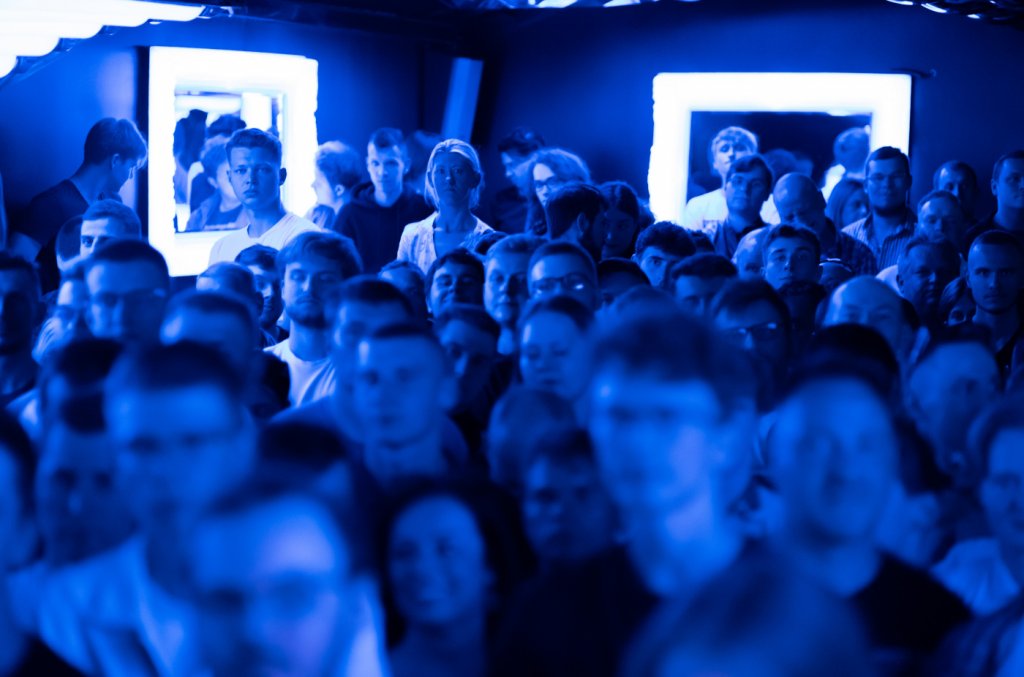
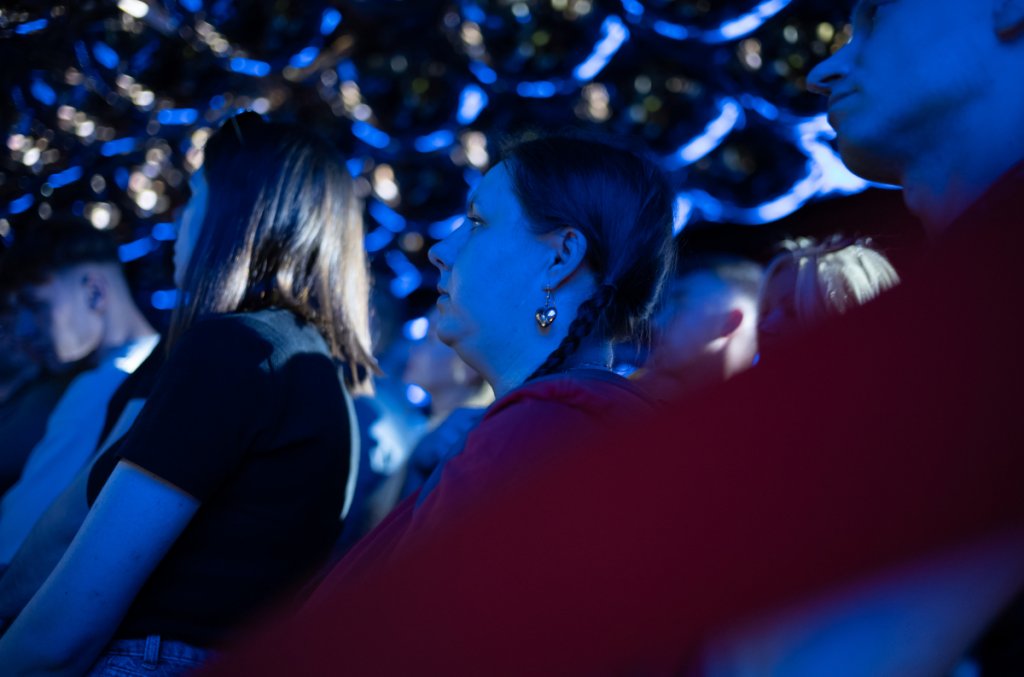
We line up at the end, others immediately follow: four young men in their thirties come with a pack of Tatra beers, we hear cans being opened behind our backs, they politely ask if we would like some.
“I haven’t stood in a queue this long yet,” nods one of them in surprise.
“Because you don’t remember the queues, you’re too young,” replies the other.
A guy walks along and films with his cell phone, which outrages a woman in the crowd who tries to snatch it from him. Apart from that, it is peaceful, it feels like a picnic, or even a party.
“What a crowd behind us, not everyone will fit, Mentzen will have to arrange another ‘beer’,” I remark.
“An after party, more like” the guys laugh. “Once we are ‘mentzened out’.”
Kamila Matolicz is already there. Inside, two ladies in their forties break through to the stage and take a selfie with the shiny golden statue of Prime Minister Mateusz Morawiecki,
which Mentzen brings to all meetings.
“Without glasses, this Morawiecki guy is even handsome,” notes one.
“If you put a pot over his head,” Kamila is outraged. Shortly before Mentzen’s speech, a bottle of beer breaks on the floor. I think to myself that it is likely to be first of many that evening, but it seems to be the only one.
“A Spaniard, an Italian, or a Frenchman drinks wine with dinner every day and that is a mark of great culture, elevation, and communing with the sublime, but if a Pole wants to drink beer, it’s a big scandal, because a Pole drinking is supposedly rowdy. Therefore, ladies and gentlemen, let’s show that we know how to drink culturally and let’s all have a nice drink.”
Mentzen raises a slender glass and takes an ample gulp of the first of the evening’s five beers. The crowd cheers, some raise their bottles, ladies who took selfies with the golden Morawiecki shout loudly: “Bravo!”.
Mentzen ridicules politicians and journalists who harp on his five postulates from four years ago and do not understand his jokes. He lambastes the representatives of other parties.
Then it’s time for questions. Mainly about the economy and taxes, but also about equality, the ruling party, immigrants.

“I’m surprised at the variety of people who are here,” Marcin Ndzondzo gets excited. Nearby, a pair of teenage punks, in torn clothes, with safety pins all over, listen attentively to Mentzen. “I often feel the eyes of others on me, and here it’s like I’m home, no one pays attention to me. Didn’t I tell you Konfederacja is not racist at all? I dare anyone to convince me otherwise! This is a tent that’s increasingly broad.”
After the meeting, a crowd of mainly young men pours out of the bunker at Wały Piastowskie. A couple of women with brightly dyed hair pass by, in a tender embrace.
None of the people leaving pays any attention to them.
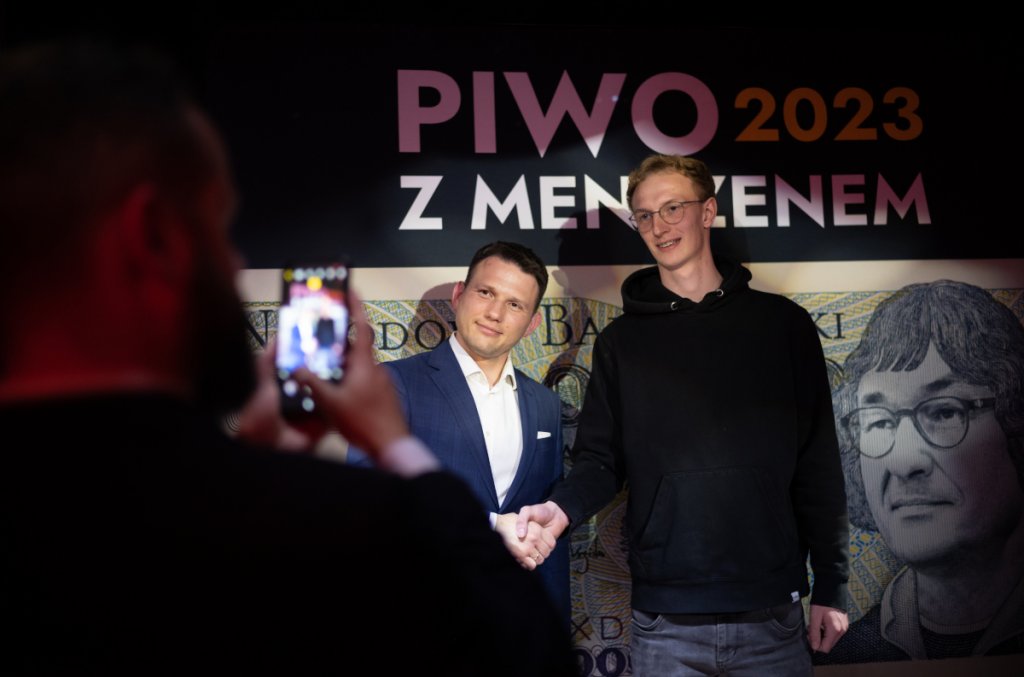

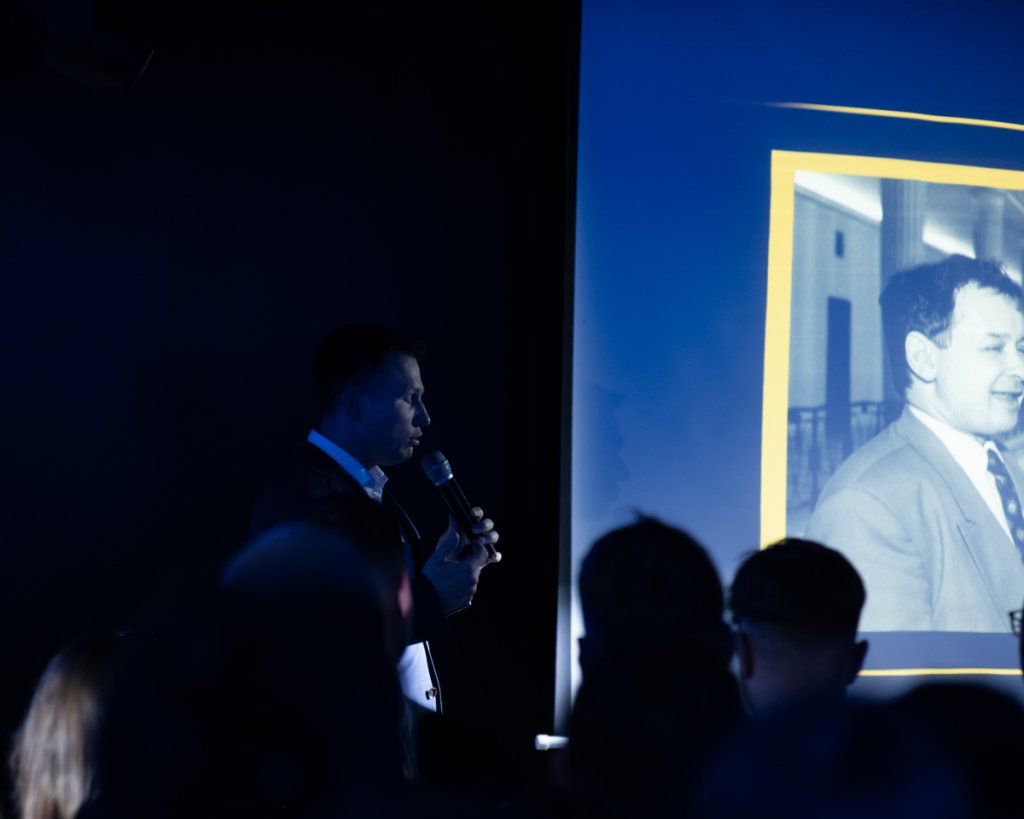
We visit Marcin in the sushi bar where he works so Agata can do a photo shoot. I tell him about the Glinieckis’ disappointment with the fact that there was no talk of the pandemic at Konfederacja’s convention. My interviewees have been united in their criticism of the tough anti-covid restrictions. However, they have different opinions on the pandemic itself, as well as vaccinations.
“We have some friends who have not gotten vaccinated. Monika, my fiancée, although she works in healthcare, does not try to convince them. We believe that it is their choice. We have been vaccinated twice.”
Elections
In the spring, Marcin Ndzondzo invites me to his hometown of Suwałki. On Corpus Christi, he plans to bring his fiancée and her parents. The families will be able to get to know each other, perhaps discuss wedding plans. I will be able to talk to everyone, Agata will take pictures. However, shortly after that, he sent me a message: “As for the photos and the interview, my parents don’t want to be shown, so we will have to let it go. They do not want to be associated with Konfederacja, but they emphasized that if I want to, it is my choice. I respect their decision.”
Due to their upcoming wedding, they are not going on vacation this year and probably will not go next year either. They tell me about it when we talk in a seaside café that summer. They want to save money. First, Monika will graduate from university, they will have a modest wedding reception, then there will be time for children.
In August, I visit all my interlocutors for the last time.
I meet Zbyszek Zalewski, his girlfriend Mariola, and his friend Michał at a restaurant belonging to an Albanian. They supported his restaurant through the pandemic, when the immigrant’s business hung by a thread.
I ask Zbyszek about the future of Poland in Europe. He replies that its place is in the European Union, but one functioning on the same principles as the former European Economic Community (an organization operating in the years 1958–2009 that initiated the processes of European integration).
“The Maastricht Treaty in in 1991 began this excessive formalization, and the Treaty of Lisbon of 2007 was the last straw. As Korwin-Mikke used to say, every Union must eventually collapse,” says Zbyszek. A few days later, he and Mariola are already on their way to Albania. They intend to spend vacation there and consider investing in real estate, because it seems that this country will soon be “another Croatia”.
In Gdańsk, I meet Kamila Matolicz on one of the hottest days of summer and on the thirty-third birthday of her boyfriend Marcin. I invite them for a birthday beer. Neither of them go to pubs often. Kamila, mainly due to the lack of money, did not even go to her younger sister’s wedding.
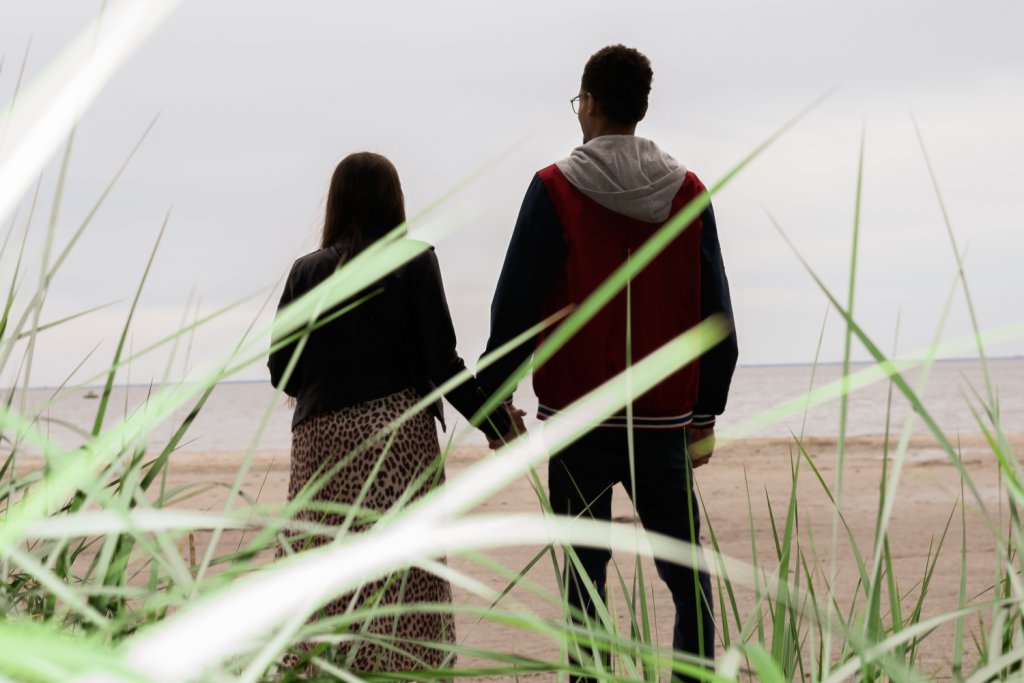
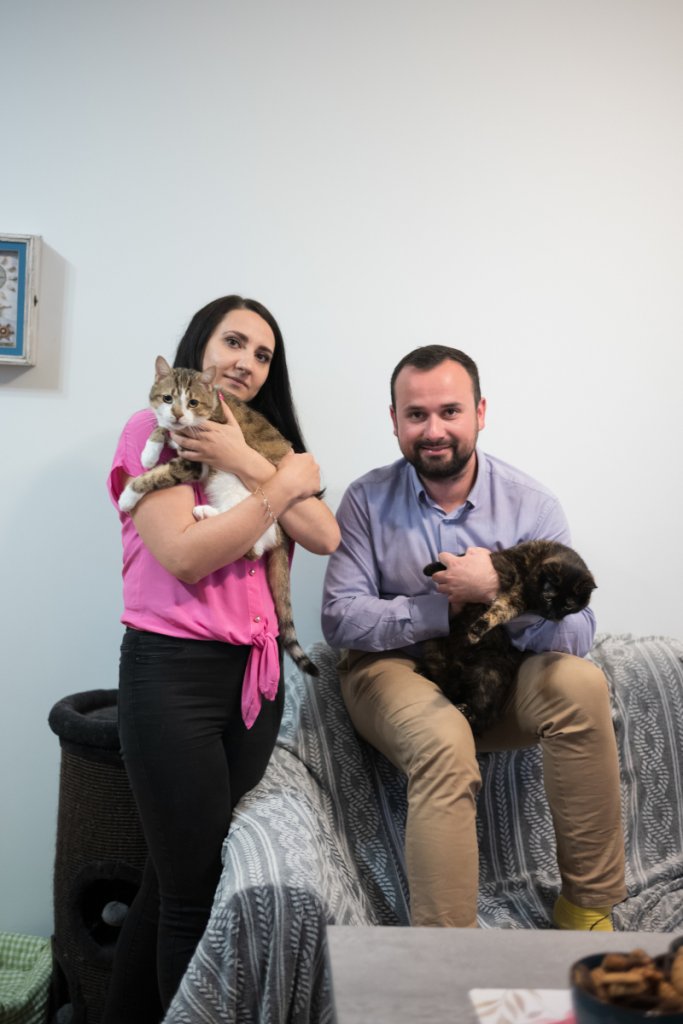
They pick me up from the station and lead me as far as possible from the hustle and bustle of Długa Street, where beer costs at least one and a half times more than elsewhere, but also to – I have the impression – to be as far away as possible from fashionable places full of wealthy people, tourists, and foreigners.
“Supposedly there was no relocation, but there are plenty of darkies around,” Marcin points to three Indians passing by, as we sit in the garden away from the crowds. He also complains about the Germans “lording it” in the city centre. I ask about the reason for the aversion to foreigners. He confides in me that he does not trust them, because it seems to him that they are making fun of us, Poles, at every step.
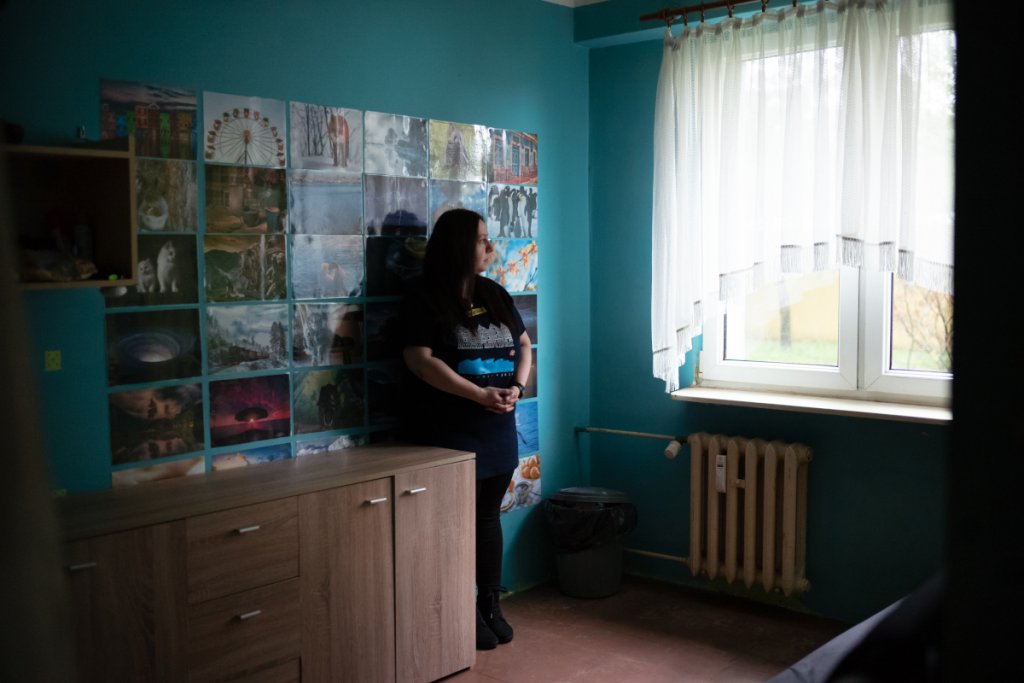
Kamila complains that she is increasingly being called a “Russian troll” on TikTok. On the other hand, more and more people are tearing down Ukrainian flags, at least that is what she concludes from the number of videos on the Internet.
She also talks about her eldest daughter’s boyfriend: he wants to change his name.
“Well, who would want to be called ‘Tusk’?”
“Maybe he will finally gain some approval from you?” I ask Kamila.
“No!” she replies angrily.
Rafał Buca defends his bachelor’s degree in political science at the University of Gdańsk: Spanish nationalism of the second wave in the face of transformations aimed at the crystallization of the Francoist doctrine; he becomes an expert on Spain in Nowy Ład [“New Deal”], a nationalist think tank. We meet for the last time in the second half of August, in the same Warsaw café near the Sejm (again, he’s here for two days of work). He has slept for two hours, this morning he came from Chorzów, straight from a concert – he is a big fan of Sanah.
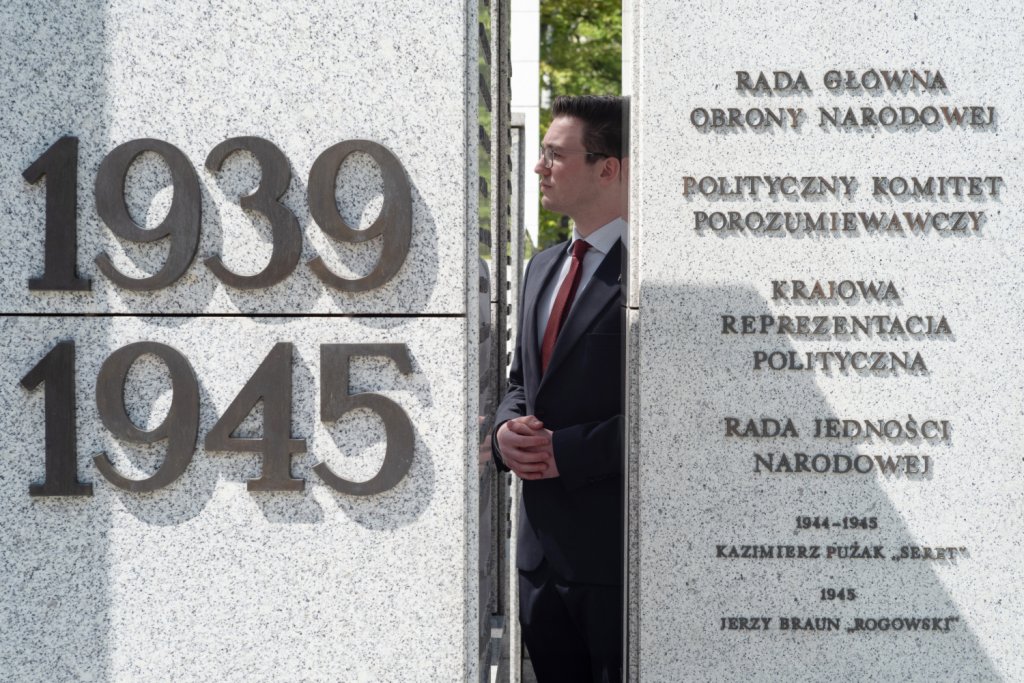
Rafał continues his studies in political science at the master’s level, he is thinking about a postgraduate degree in public relations. Before the elections, he works in the electoral headquarters of MP Urbaniak.
In September, Michał Jankowski decides that this time he will not vote for Konfederacja, but for the Third Way. There are several reasons: his candidate, Artur Dziambor, after being expelled from the party, got on the list of PSL [a member of the Third Way coalition – translator’s note], “Konfederacja’s list in Gdynia is so tragic that it hurts your eyes to look at it”, and the additional seat will probably be snatched by the Third Way from Konrad Niżnik from Confederacy of the Polish Crown, whose views Michał considers dangerous. And – no less important for him – the Third Way getting a result “above the electoral cut-off is crucial to unseating PiS”.
“If Konfederacja enters into a deal with some of the ‘post-Round Table’ party, who are constantly in power, it will be the beginning of the end for them,” the closer to 15 October, the more pessimistic Kazimierz Gliniecki becomes. “They will end up like Giertych or Lepper. Or even worse, because through this cooperation they can even end up as scapegoats for all the scams and go to prison. On the other hand, if Tyszka, who has no connection with Pomerania, is to win the election here, the Confederacy of the Polish Crown is the only hope. And these idiotic questions that the current so-called government wants to put in the referendum are like the joke: ‘Do you want things to be better, but they will be worse?”
In the summer, the Glinieckis receive bad news: doctors find an infiltration near Gabriela’s liver, suspect cancer, and finally deliver a diagnosis of a benign tumour on the intestine. Two surgeries in four days, diet, loss of nine kilograms and general fatigue. Because of this distraction, the Glinieckis have to cancel their September trip to Albania, whose Muslim milieu they simply love, along with a trip to a town in Macedonia, which is famous for its real pearls. They stay at home, Gabriela recovers.
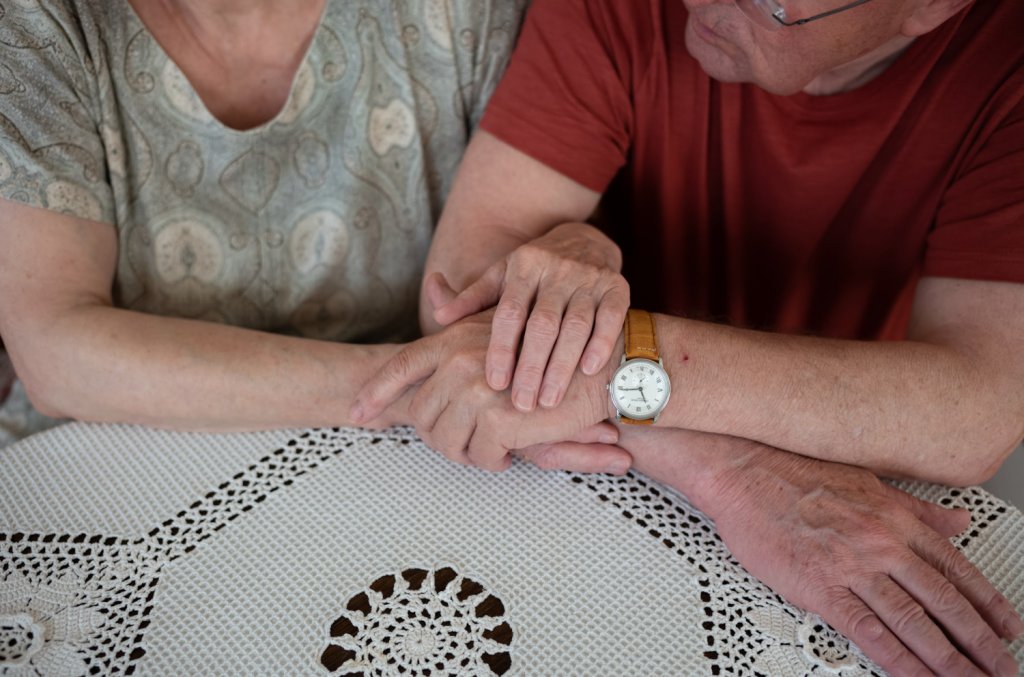
In the hospital, Kazimierz visits her every day – over two hours’ drive back and forth to Gdynia. He washes her and cares for her. On the day of our last meeting, he takes her to a hairdresser in Sopot and drops me off in the Tri-City. Along the way, they excitedly tell me about how the world is littered with plastic. I am carrying three jars of their fruit preserves (“Just don’t eat it on the way, it’s for the children!”). At one point, Kazimierz changes the subject, recalling a conversation between right-wing publicists: Stanisław Michalkiewicz and Tomasz Sommer.
“They said it was a waste of money to build this wall on the border with Belarus. A border guard might shoot at someone when they try to force it. He will have to explain it, might get in trouble.”
Kazimierz believes that there are better ways to protect the country from migrants; cheaper and more effective.
“Not involving such a large number of troops and without endangering anyone, like electromagnetism or some other type of deterrent.”
In protest against the foisting of a transferee on the Gdynia electoral list, the Glinieckis sent a letter to Sławomir Mentzen with a request for a refund of the voter fees in the January primaries. They gave him their account number. They are now waiting for the transfer of 40 zlotys.
The text was created with the support of the ZEIT STIFTUNG BUCERIUS.

Text: Mirosław Wlekły
Photos: Agata Grzybowska
Editorial supervisio: Magdalena Kicińska
Editing: Urszula Kifer
Fact-checking and infographics: Marcin Czajkowski
Digital publishing: Ewa Pluta
